Saturday, May 14, 2016
The American middle class is losing ground in metropolitan areas
The American middle class is losing ground in metropolitan areas across the country, affecting communities from Boston to Seattle and from Dallas to Milwaukee. From 2000 to 2014 the share of adults living in middle-income households fell in 203 of the 229 U.S. metropolitan areas examined in a new Pew Research Center analysis of government data. The decrease in the middle-class share was often substantial, measuring 6 percentage points or more in 53 metropolitan areas, compared with a 4-point drop nationally.
The shrinking of the middle class at the national level, to the point where it may no longer be the economic majority in the U.S., was documented in an earlier analysis by the Pew Research Center. The changes at the metropolitan level, the subject of this in-depth look at the American middle class, demonstrate that the national trend is the result of widespread declines in localities all around the country.
The widespread erosion of the middle class took place against the backdrop of a decrease in household incomes in most U.S. metropolitan areas. Nationwide, the median income of U.S. households in 2014 stood at 8% less than in 1999, a reminder that the economy has yet to fully recover from the effects of the Great Recession of 2007-09. The decline was pervasive, with median incomes falling in 190 of 229 metropolitan areas examined. Goldsboro ranked near the bottom with a loss of 26% in median income. Midland bucked the prevailing trend with the median income there rising 37% from 1999 to 2014, the greatest increase among the areas examined. 4
In other words, households may have moved from the middle- to upper-income tier simply by staying put or perhaps increasing income only a modest amount. Those households that dropped into the lower-income tier from the middle lost even more income than the median dropped, outpacing the economic downturn and losing even more ground than these comparisons suggest.
Some of these issues relate to local economies, some to the national stagnation that has followed the Great Recession. But this study makes a good data point to explain the political environment of this cycle and the anger that has fueled it. Perhaps nothing might explain it better than the fact that the greater DC area ranks third among the percentage of metropolitan areas with the highest percentage of upper-income households (32%), behind Midland, Texas and the Bridgeport, Connecticut region. The rich get richer … and the powerful, too.
I think it is not helpful that the country is being flooded by low-income illegals. It's undercutting wages not just of entry level positions, but of skilled contractor / construction type jobs across the board.
According to the Pew Hispanic Trust, less than 4% of illegal aliens in the U.S. are employed in agriculture of all types. The vast majorities work in substantial jobs such as CONSTRUCTION, ROOFING, landscaping, and EVEN MASONRY and plumbing, where their low wages have driven many millions of Americans out of work.
I blame the Federal Reserve and the Keynesian philosophy that drives it. The middle class is wealthy enough to have some savings, but generally not wealthy enough to be heavily invested in anything but their own families. This means that Keynes-inspired inflation steals from the middle class and gives that money to the investor class. Quantitative Easing did this even more directly, by deliberately inflating stock market prices (helping investors) to stop deflation (which would have helped those with savings).
Of course minimum wage laws also contribute, by dividing the country into those with high-paying jobs, and those who can't find ANY job.
So do you mean it would be better if more low-income jobs were done by Americans? Or do you mean it would be better if Americans had to pay more to have those jobs done?
Tiffany Zhang It's true that if you flood the country with low wage illegals then consumers of services, as construction services, will pay less.
But the costs are HUGE. The erosion of the incomes of the lower and middle classes means greater inequality and greater entitlement and welfare costs, so ultimately much of the 'savings' of higher income consumers is lost to taxes. Further, in the US we are seeing the thirdworldification and bi-lingualification of the country. That's not necessarily a welcome addition.
Worst of all the demographic change tilting the country heavily toward the low income immigrants and their low income offspring will ... TURN THE COUNTRY SOCIALIST. So those 'savings' in service costs will ultimately be paid for in higher taxes for socialist redistribution and entitlements, and probably in direct socialist property confiscations.
Wednesday, April 27, 2016
Megyn Kelly interview could be Trump’s greatest media triumph
Megyn Kelly versus Donald Trump. It’s been the biggest media story of the 2016 GOP presidential race. And yesterday’s news
that Trump has agreed to sit for a one-on-one interview with Kelly in
May not only ushers in a new chapter in a months-long saga, it could
also represent a triumph for Kelly and Fox News, but also for Trump’s
designs on the White House.
It began in the opening minutes of the very first debate when Kelly challenged Trump on his past statements to women:
“Mr. Trump, one of the things people love about you is you speak your mind and you don’t use a politician’s filter. However, that is not without its downsides, in particular, when it comes to women. You’ve called women you don’t like ‘fat pigs,’ ‘dogs,’ ‘slobs’ and ‘disgusting animals.’ …Trump’s reaction after the debate was to accuse Kelly of journalistic bias and to attack her integrity and credibility. Legions of Trump supporters hurling misogynistic and vitriolic venom at Kelly via social media, some of the attacks enjoying the imprimatur of Trump himself via a re-tweet from his powerful Twitter account.
Your Twitter account has several disparaging comments about women’s looks. You once told a contestant on ‘Celebrity Apprentice’ it would be a pretty picture to see her on her knees.
Does that sound to you like the temperament of a man we should elect as president, and how will you answer the charge from Hillary Clinton, who was likely to be the Democratic nominee, that you are part of the war on women?”
Trump personally went after Kelly in a vicious, personal way:
“Certainly, I don’t have a lot of respect for Megyn Kelly. She’s a lightweight and y’know, she came out there reading her little script and trying to be tough and be sharp. And when you meet her you realize she’s not very tough and she’s not very sharp.” Then, came the kicker: “She gets out there and she starts asking me all sorts of ridiculous questions, and you could see there was blood coming out of her eyes, blood coming out of her … wherever.”And it just got worse from there. Trump boycotted the Fox News debate in Iowa after a hot exchange of tweets and press releases. They met in a debate setting once more in March but most of the fireworks that night came from Marco Rubio and Trump’s hand size.
Now, as the primary season winds down and Trump begins to focus on his potential nomination in Cleveland and the general election showdown with Hillary Clinton, he’s decided it’s time to put the feud behind him. The announcement of the exclusive, in-depth interview scheduled for May 17th could very well be the turning point of Trump’s negative numbers with women voters (which Politico reports are hovering around 70%.)
To see this interview with Kelly as a media triumph, we have to make a couple of reasonable assumptions. First, let’s assume Kelly conducts the interview in the same way she does every night on The Kelly File, with tough, relevant and respectful questions meant to illuminate an issue and not alienate her guest. Let’s also assume that Trump, knowing all eyes are on him, will conduct himself in a respectful and restrained way including a legitimate walk-back from some of the more over-the-top comments he’s made about the Fox News superstar.
I’ll even predict that Trump offers a statement of regret (if not an actual apology) over how the feud spun out of control and how Kelly was negatively impacted by the vitriol from Internet trolls. I suspect Trump takes the opportunity to state that although he’s had differences with her, he admires the classy way Kelly has conducted herself and they let bygones be bygones from this point forward.
I think it’s also a fair assumption that Kelly accepts the apology. Why wouldn’t she? Not only has she expressed that she dislikes being “part of the story” but it positions her as a major media player in the run up to the general election. It also puts pressure on Hillary Clinton to sit with her for a similar interview. After all, Clinton recently praised Kelly as a “superb journalist” who didn’t deserve the rough treatment doled out by Trump. Well Mrs. Clinton, if Trump scould face Kelly, the “superb journalist,” why can’t you? Or, is she just a “superb journalist” when she serves your purposes as a “victim” of Trump’s misogyny? If you really respect Kelly as a journalist, grant her the ultimate respect and sit with her, one-on-one, like Donald did.
Kelly has already laid the groundwork for a “Kumbaya” moment with this quote from the Fox News statement announcing the interview:
“Mr. Trump and I sat down together for a meeting earlier this month at my request. He was gracious with his time and I asked him to consider an interview. I am happy to announce he has agreed, and I look forward to a fascinating exchange — our first sit-down interview together in nearly a year.”If this interview goes the way I’ve laid it out, and both parties walk away with mutual respect and a “contrition sound-byte” that plays all over social media and the media for multiple news cycles, it’s a win for Kelly, a win for Fox News, and it reverses one of the most unfortunate and ugly narratives of the Trump presidential campaign.
If he can do that, it may be one of the greatest media triumphs of modern presidential politics.
Big “ifs,” I know, but not implausible at all.
Monday, April 25, 2016
Brave new world: A majority of millennials reject capitalism
I hate to sound too much like the old man standing on his lawn
yelling at clouds, but perhaps we have something of a parallel here in
the United States in terms of rejecting sanity. Most of our millennials
apparently have rejected capitalism, seeing it as the cause of all their
woes, and they may be turning their eyes wistfully toward a more
socialist style of living as the answer to their problems. (Washington Post)
But a more disturbing possibility is that we’ve entered a period where the population begins to fall victim to the old maxim of forgetting history and being doomed to repeat the mistakes of the past. The truth is that socialism has gotten something of a makeover in the modern era, with people frequently looking to places like Switzerland as a model. (Never mind the fact that Switzerland is actually one of the more capitalist places on Earth.) Further to the north, Sanders and his followers also like to point to the Scandinavian nations as the socialist paradise of their dreams. But as an excellent article in the Federalist pointed out recently, it’s really no paradise at all.
In the modern era, if our unhappy millennials really want to learn something about the true face of socialism they should look to places like Venezuela. Under the control of Hugo Chavez, the people of that nation didn’t actually experience any sort of boom times and are now facing the implosion of their society, as Kevin Williamson recently pointed out.
There is no good outcome from socialism in the long run and those who have lived too long in a prosperous nation like America need to crack open their history books before signing on for a new revolution. Democratic capitalism has its own warts and flaws to be sure and not every outcome is a happy one for every citizen, but it’s also a self-correcting system. Gross imbalances tend to be ironed out through the political force and will of those for whom it fails to deliver. So be careful what you wish for, millennials. You might just get it good and hard.
In an apparent rejection of the basic principles of the U.S. economy, a new poll shows that most young people do not support capitalism.Is this something real or is it just some sort of offshoot of the Bernie effect? 33% of the entire nation doesn’t sound like much but it probably works out to a fair portion of the supporters that Sanders is pulling in from the Democratic base. If that’s the case then it may tone back down once the primary ends and Bernie sails off toward retirement. They clearly won’t be getting a lot of support from the smaller percentage of young people supporting Hillary since her associations with the gold mine of Wall Street are well known.
The Harvard University survey, which polled young adults between ages 18 and 29, found that 51 percent of respondents do not support capitalism. Just 42 percent said they support it.
It isn’t clear that the young people in the poll would prefer some alternative system, though. Just 33 percent said they supported socialism. The survey had a margin of error of 2.4 percentage points.
But a more disturbing possibility is that we’ve entered a period where the population begins to fall victim to the old maxim of forgetting history and being doomed to repeat the mistakes of the past. The truth is that socialism has gotten something of a makeover in the modern era, with people frequently looking to places like Switzerland as a model. (Never mind the fact that Switzerland is actually one of the more capitalist places on Earth.) Further to the north, Sanders and his followers also like to point to the Scandinavian nations as the socialist paradise of their dreams. But as an excellent article in the Federalist pointed out recently, it’s really no paradise at all.
In the modern era, if our unhappy millennials really want to learn something about the true face of socialism they should look to places like Venezuela. Under the control of Hugo Chavez, the people of that nation didn’t actually experience any sort of boom times and are now facing the implosion of their society, as Kevin Williamson recently pointed out.
If you consider the most meaningful measure of a country’s economic output — GDP per capita over time — you’ll see that the fat years under Chávez did not actually happen. In fact, if you chart that real (inflation-adjusted) GDP per capita by year, you’ll see that Venezuela is significantly poorer today than it was in the 1960s, 1970s, or 1980s. In fact, Venezuela’s per capita GDP reached its all-time low in 2003, under Chávez. This is no surprise: Making well-off countries poor and poor countries starving is what socialists do.Things are bad in Venezuela to be sure and the citizens there are under constant threat from their own government as well as economic collapse. But if these unhappy millennials truly want a lesson on social experimentation they should look at the Russian socialist revolution of 1917 and the ensuing virtual enslavement of the citizens who surrendered all their property and rights to the government. These are the wages of socialism and it always ends badly. In case you missed that… It Always Ends Badly.
There is no good outcome from socialism in the long run and those who have lived too long in a prosperous nation like America need to crack open their history books before signing on for a new revolution. Democratic capitalism has its own warts and flaws to be sure and not every outcome is a happy one for every citizen, but it’s also a self-correcting system. Gross imbalances tend to be ironed out through the political force and will of those for whom it fails to deliver. So be careful what you wish for, millennials. You might just get it good and hard.
Saturday, April 9, 2016
Top 100 star trek episodes
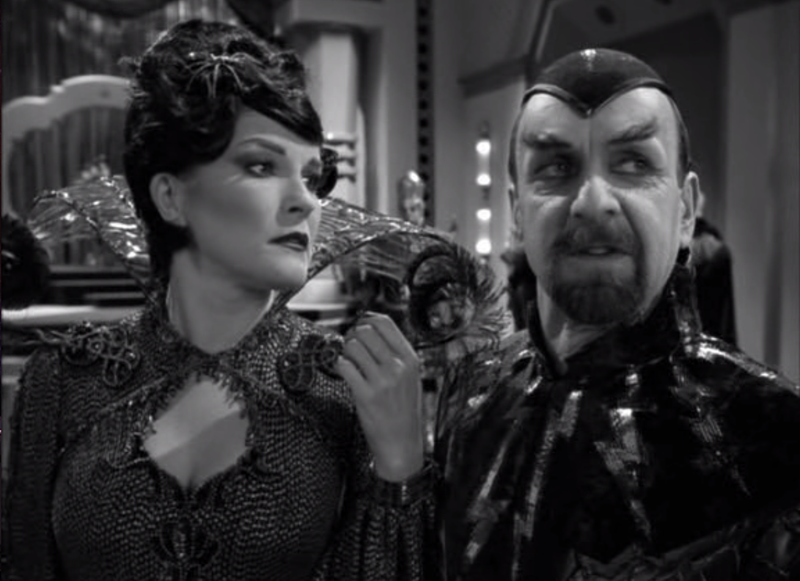
100) Bride of Chaotica! (Star Trek: Voyager) - A hilarious pastiche of old-school science fiction serials, this story puts the Voyager crew in the middle of a space-opera fantasy gone very, very wrong.
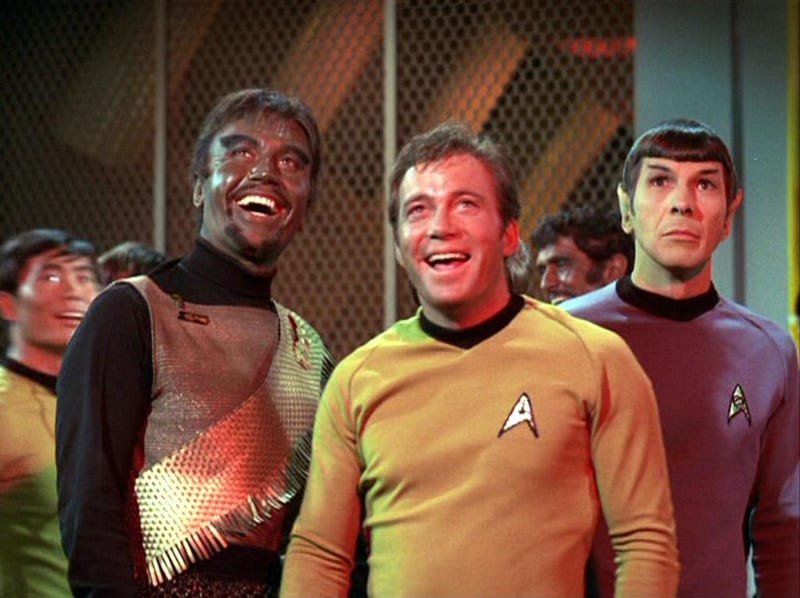
99) Day of the Dove (Star Trek) - An alien entity wants the Enterprise crew and some Klingons to slaughter each other, and Kirk has nearly as much trouble with his own crew as with the "enemy."
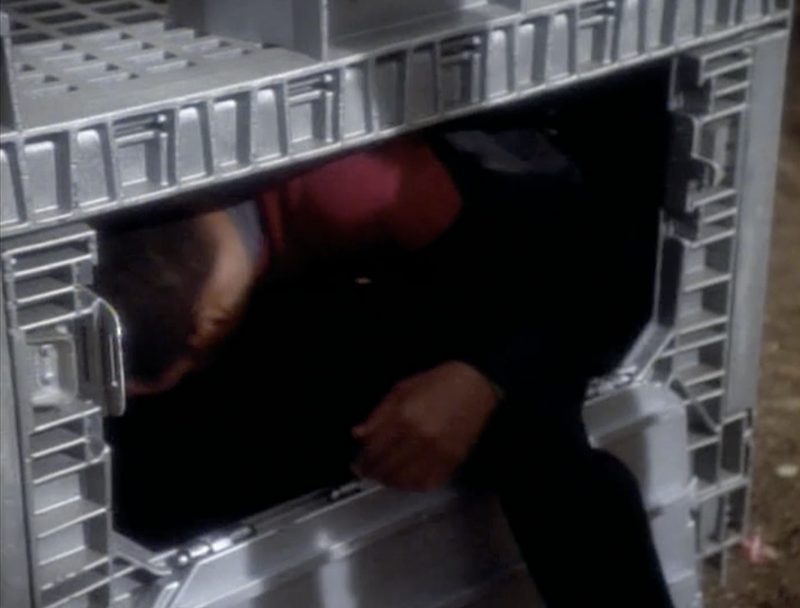
98) Paradise (Star Trek: Deep Space Nine) - Sisko and O'Brien find themselves in a "perfect" society where no technology functions, and the society's matriarch tests Sisko's will with some pretty brutal treatment.
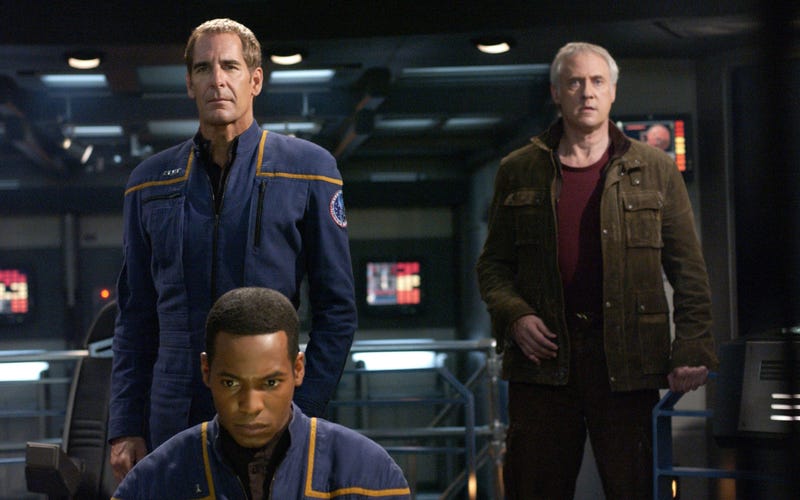
97) Borderland/Cold Station 12/The Augments (Enterprise) - In this three-part episode, we delve into the past of Khan Noonien Singh's genetically augmented crew, and also meet the ancestor of Data's creator. And connecting those two dots allows the story to get into some weird questions about the nature of "superior" people.
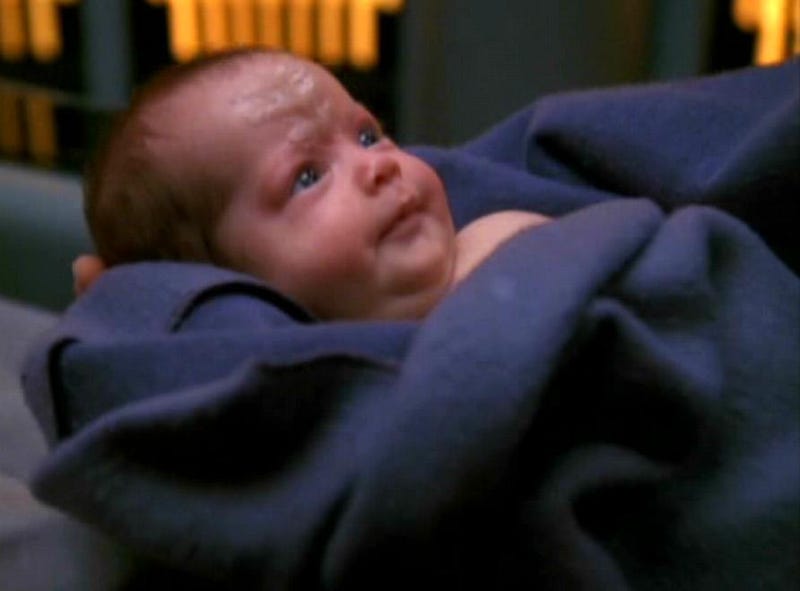
96) Lineage (Star Trek: Voyager) - B'Elanna and Tom are expecting a baby... but maybe they can genetically engineer it to be more human and less Klingon? More than any episode about Khan's people, this episode digs into the thorny ethics of eugenics.
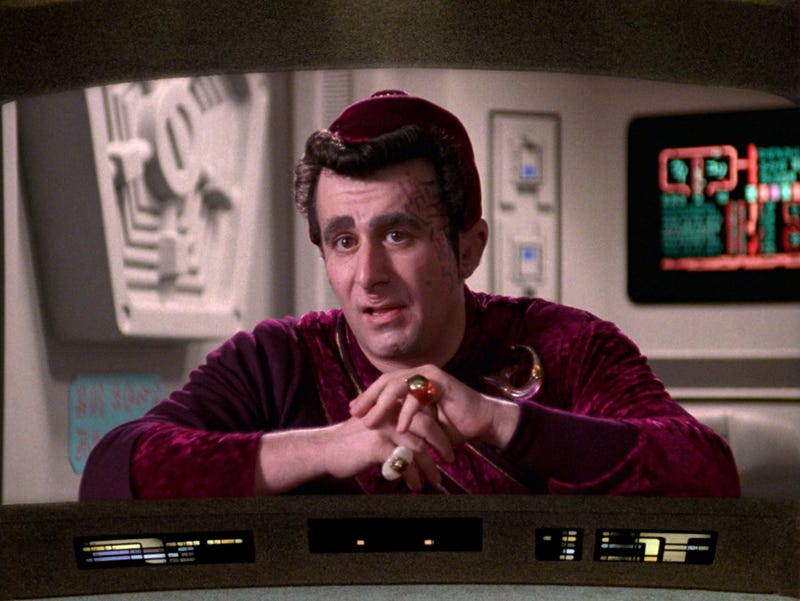
95) The Most Toys (Star Trek: The Next Generation) - Data is taken prisoner by an unscrupulous collector, and the android finds out just how far he's willing to go to win his freedom.
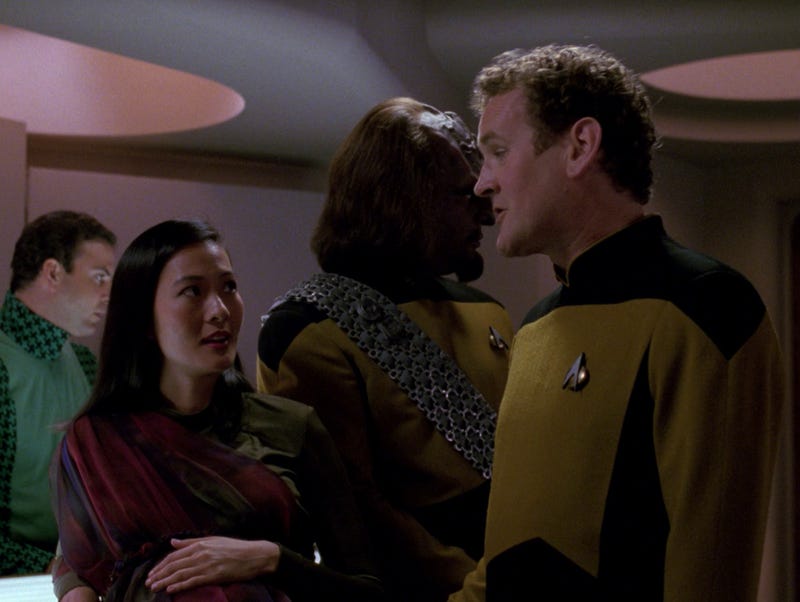
94) Disaster (Star Trek: The Next Generation) - A calamity cuts off the different sections of the ship from each other, leaving Deanna Troi in charge, and Worf having to deliver a baby.
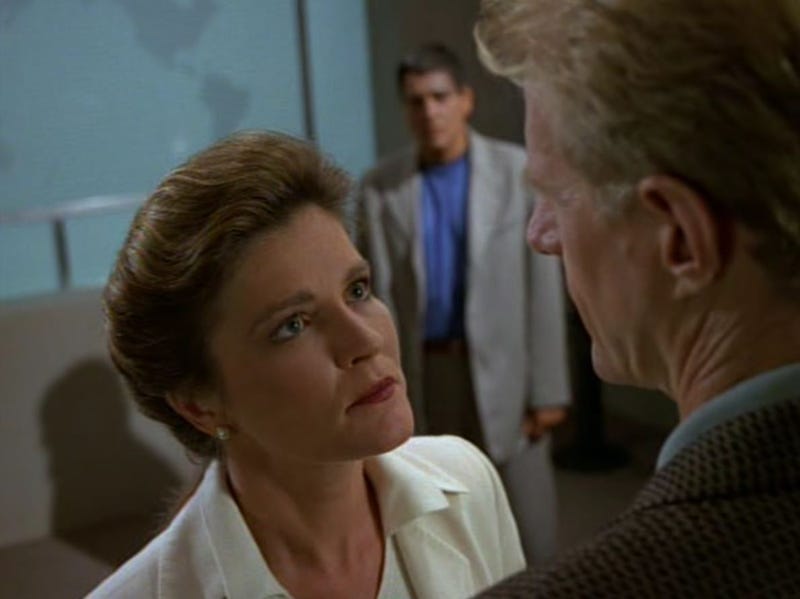
93) Future's End (Star Trek: Voyager) - An evil Bill Gates-type in the 1990s has gotten hold of a 29th century ship, and even the Voyager crew might not be able to keep him from changing history.
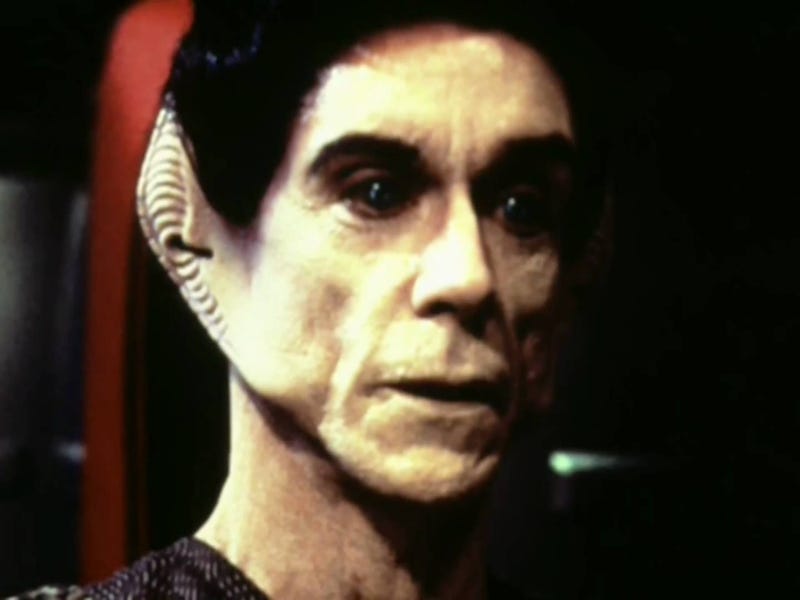
92) The Magnificent Ferengi (Star Trek: Deep Space Nine) - Of all DS9's "Ferengi comedy" episodes, this is one of the funniest — Quark has to rescue his mother from the Dominion, but everything goes absolutely pear-shaped and Quark has to improvise.
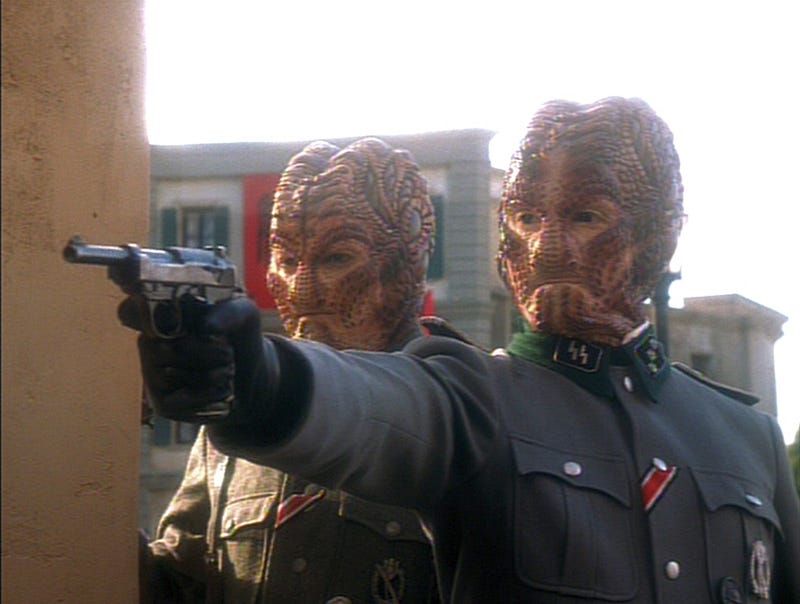
91) The Killing Game (Star Trek: Voyager) - The Hirogen love to hunt, so what could be better than turning Voyager into a recreation of World War II? (Lots of things. But that's what they do, anyway.)
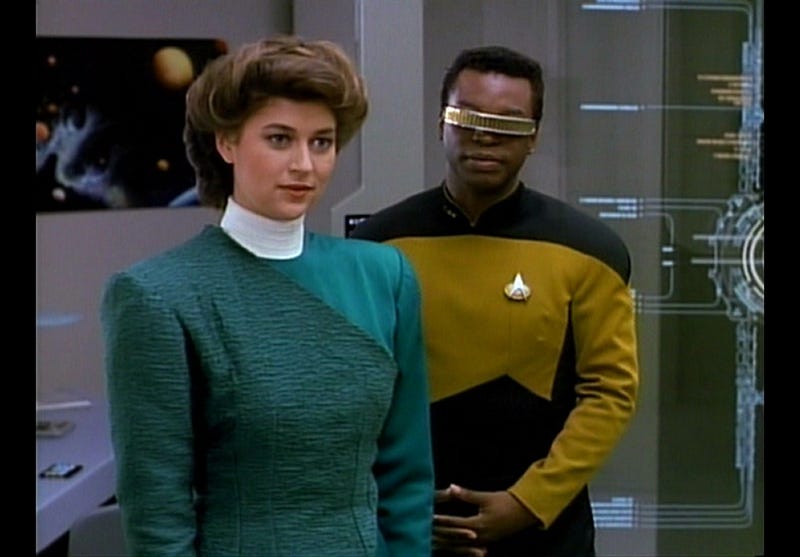
90) Booby Trap (Star Trek: The Next Generation) - The Enterprise is trapped in a weird space trap, and Geordi can't find a solution until he makes himself a new colleague... who's the woman of Geordi's dreams.
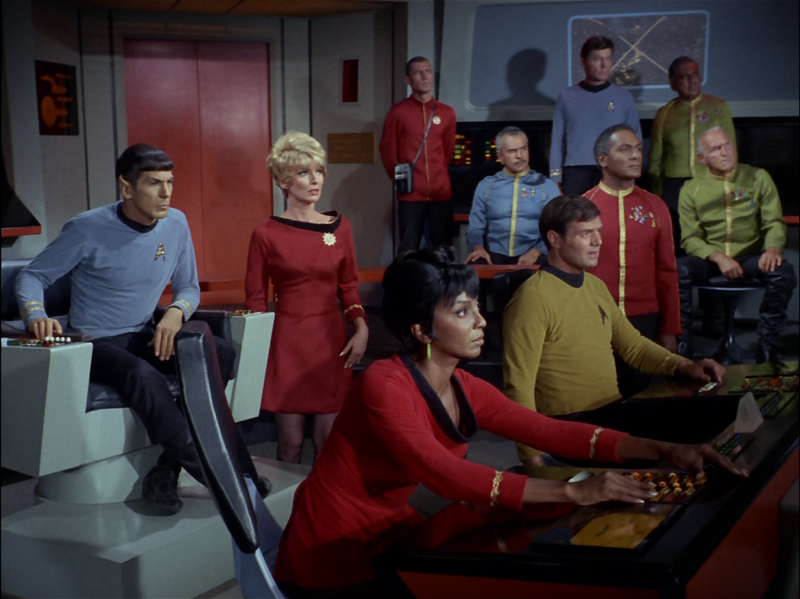
89) Court Martial (Star Trek) - Kirk is put on trial, and along the way he shows what it really takes to command a starship.
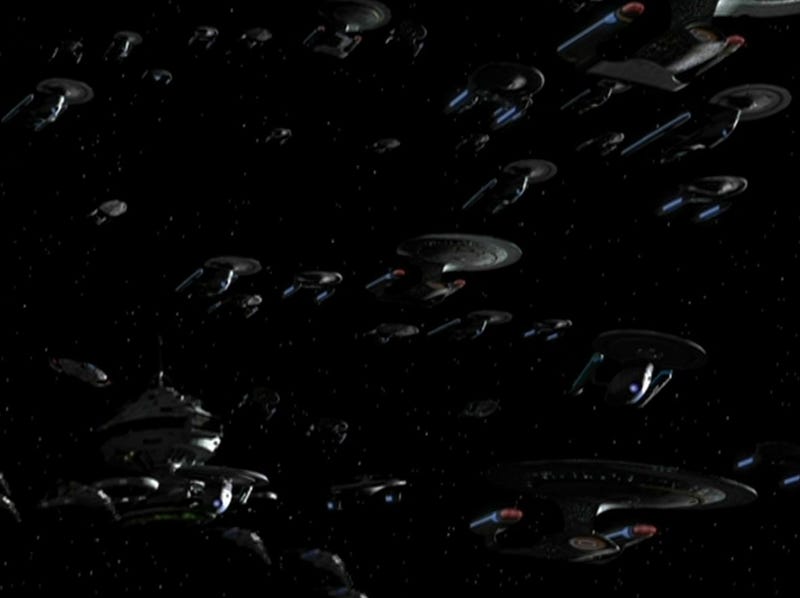
88) Favor the Bold/Sacrifice of Angels (Star Trek: Deep Space Nine) - This episode is a turning point in the "Dominion War" arc. But more to the point, it features a ginormous, amazing space battle, featuring hundreds of starships.
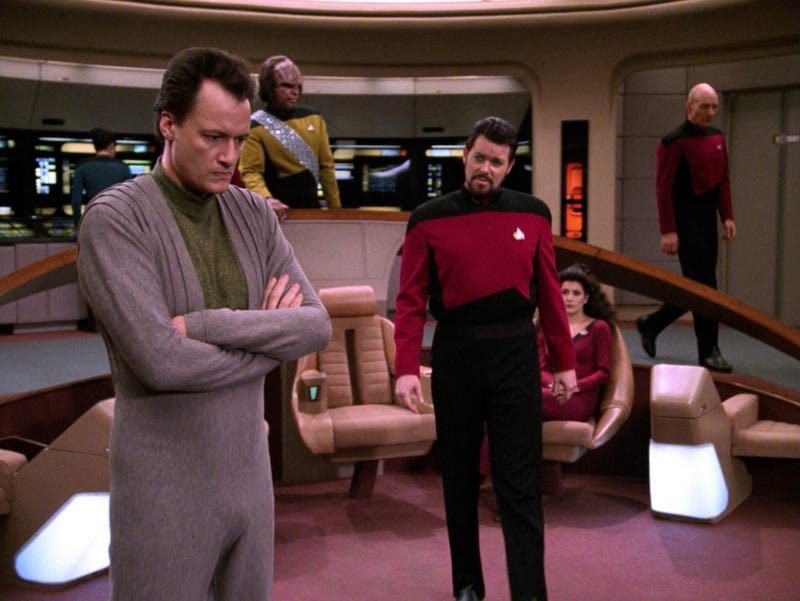
87) Déjà Q (Star Trek: The Next Generation) - Q has lost his powers, and now he's learning to cope with being human. If he can survive the wrath of Guinan, that is.
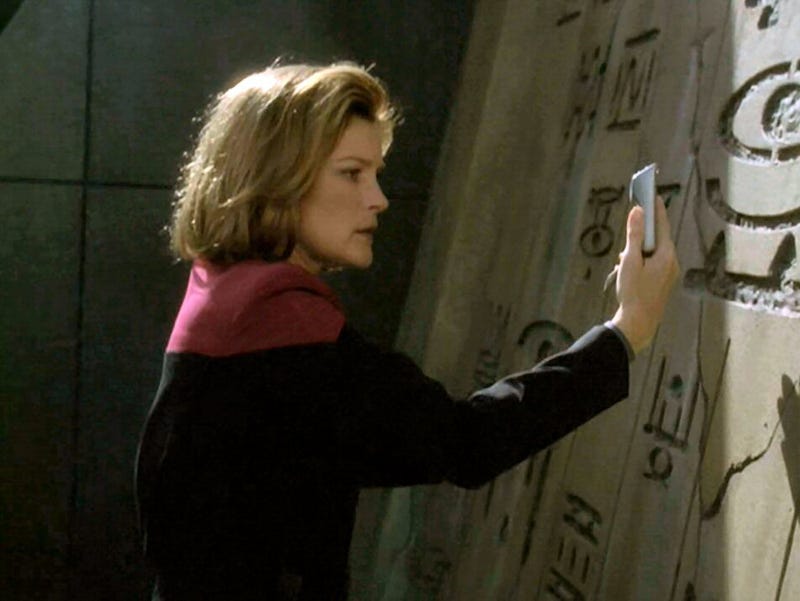
86) Memorial (Star Trek: Voyager) - Voyager was at its best when coping with strange thought experiments, and here's a doozy: a memorial forces you to experience a terrible war first-hand. Should it be allowed to remain operational?
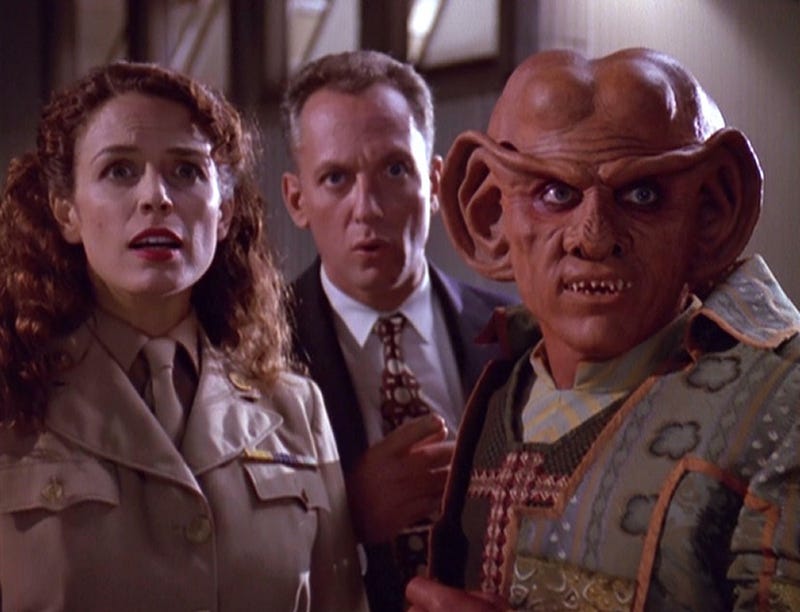
85) Little Green Men (Star Trek: Deep Space Nine) - Quark gets stranded on mid-20th century Earth, and for once even he can't figure out how to profit from this, in a hilariously weird episode.
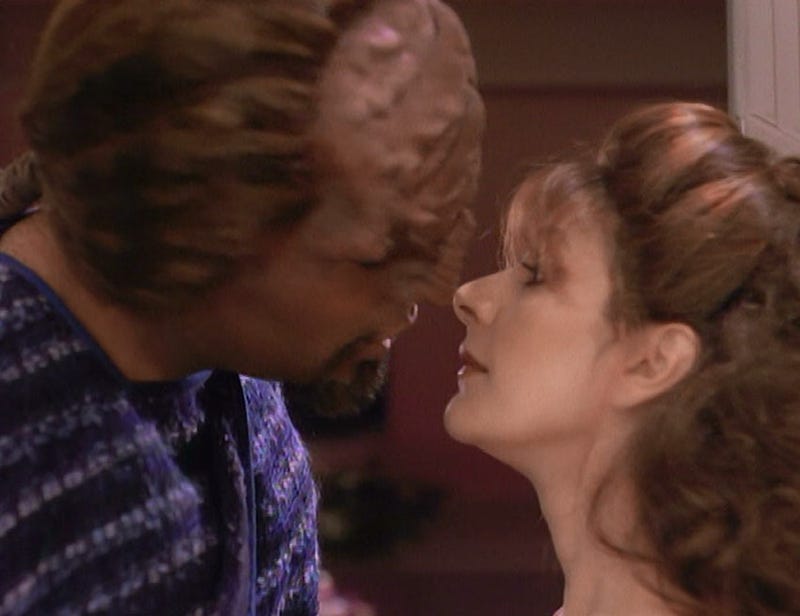
84) Parallels (Star Trek: The Next Generation) - Worf keeps jumping to various (and highly entertaining) alternate realities, showing how different his life could be with just a few changes.
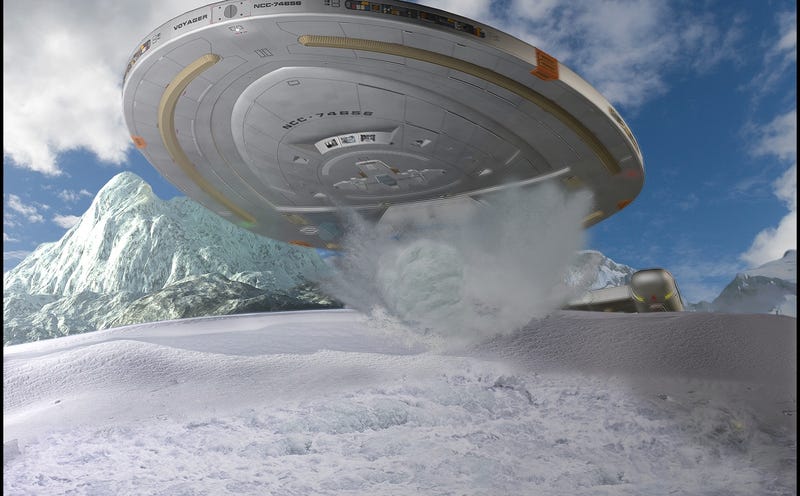
83) Timeless (Star Trek: Voyager) - One of the many "alternate future crewmembers averting a past tragedy" storylines, this one features the beautiful image of Voyager crashed into an ice planet, and Chakotay going to extremes to save his friends.
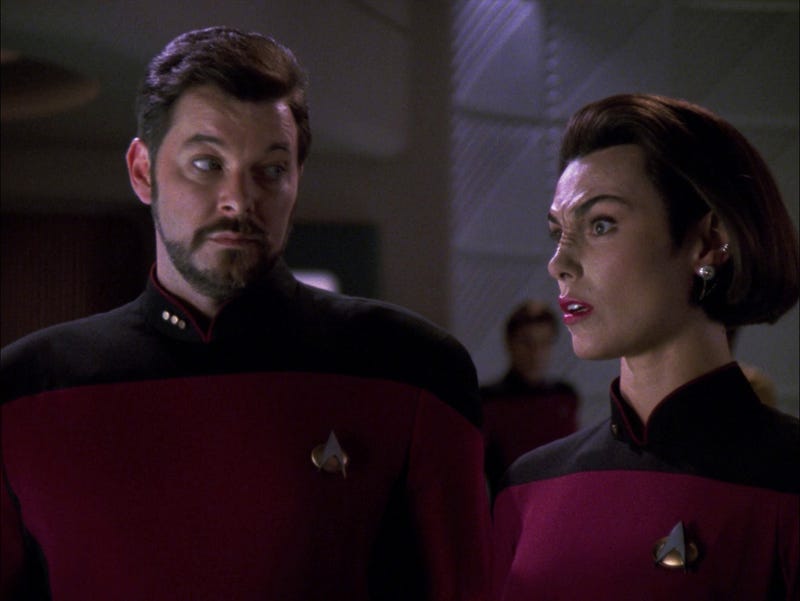
82) Conundrum (Star Trek: The Next Generation) - The entire crew of the Enterprise suffers memory loss, but luckily First Officer MacDuff is here to help. When their identities are stripped away, will the Starfleet officers still do the right thing?
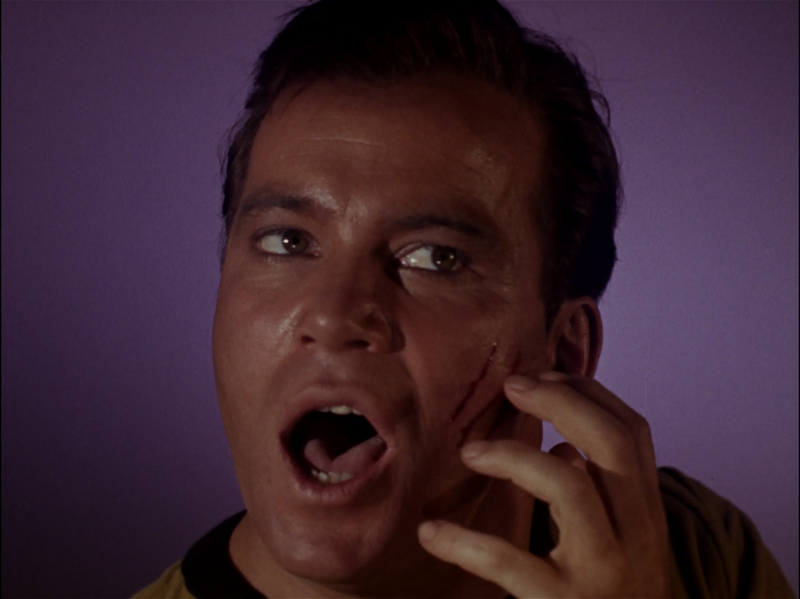
81) The Enemy Within (Star Trek) - The one where Kirk gets split into good and evil versions by a transporter accident — Richard Matheson's script manages to get into some thorny questions about the nature of evil.
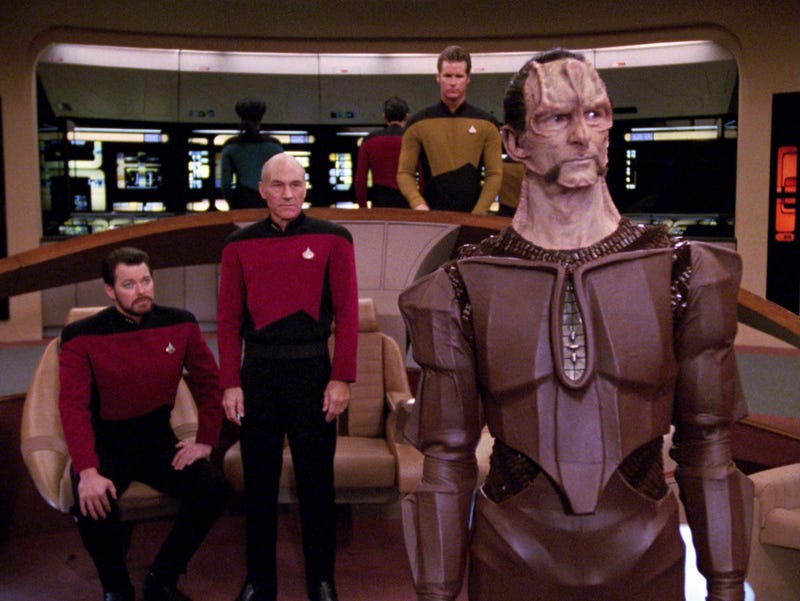
80) The Wounded (Star Trek: The Next Generation) - The Federation is trying really hard to have peace with the Cardassians, but some people in Starfleet aren't quite so ready to forgive and forget... and it's up to Picard to help out his enemies.
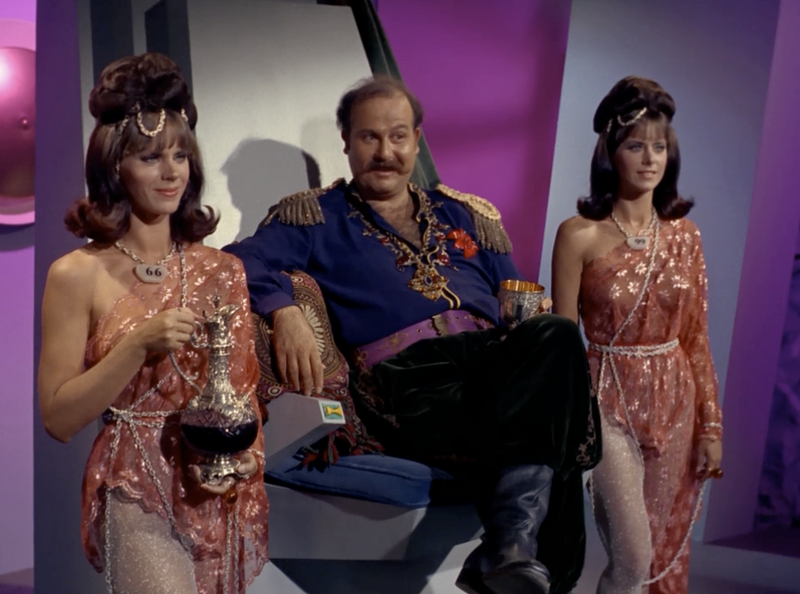
79) I, Mudd (Star Trek) - The most famous rogue in Star Trek has landed in a great spot — surrounded by beautiful androids who cater to his every whim. Except that he can't leave.
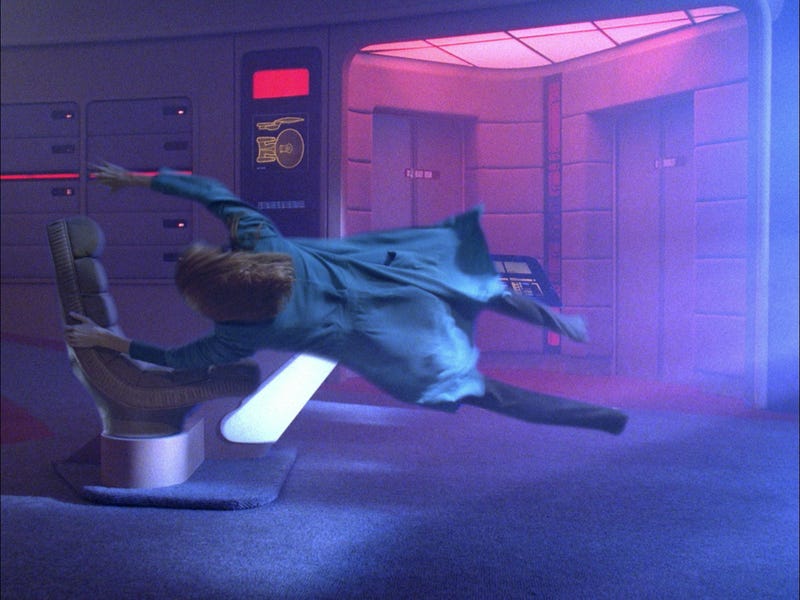
78) Remember Me (Star Trek: The Next Generation) - Dr. Crusher is faced with a mystery that gets at her fear of abandonment, but also questions of existence, when people start vanishing around her.
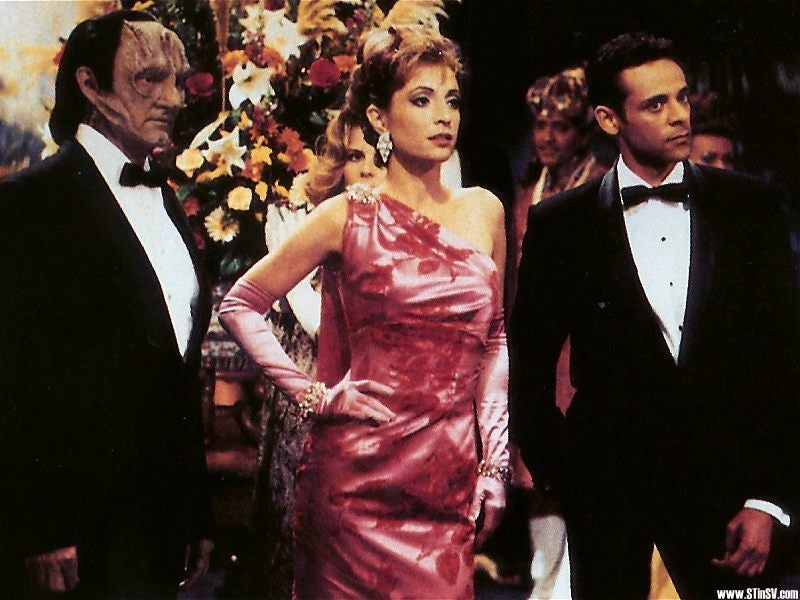
77) Our Man Bashir (Star Trek: Deep Space Nine) - The goofiest of DS9 episodes (well, one of the goofiest) sees Bashir stuck in a holosuite program where he's a James Bond-style spy.
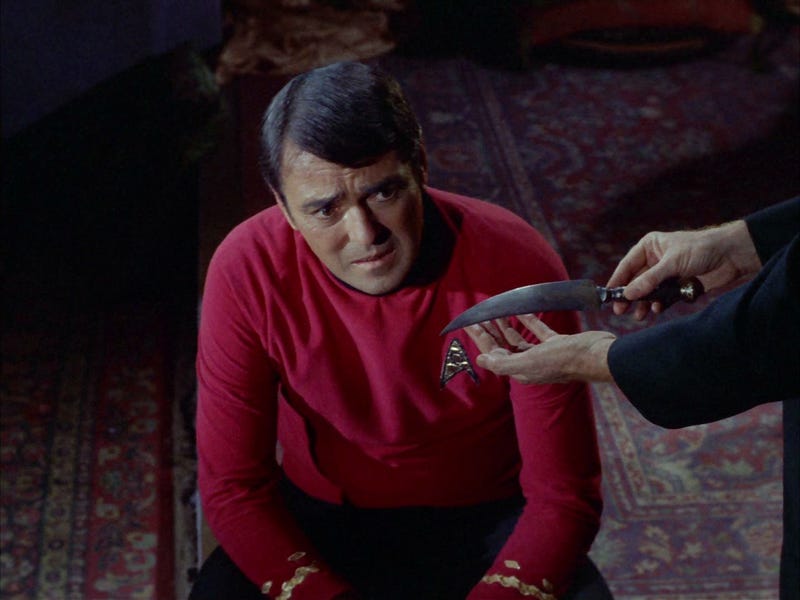
76) Wolf in the Fold (Star Trek) - Mr. Scott is accused of being a serial killer... but the truth is a lot more bizarre.

75) The Raven (Star Trek: Voyager) - One of the best "Seven of Nine tries to become more human" episodes actually sees her coping with her memories of being part of the Borg.
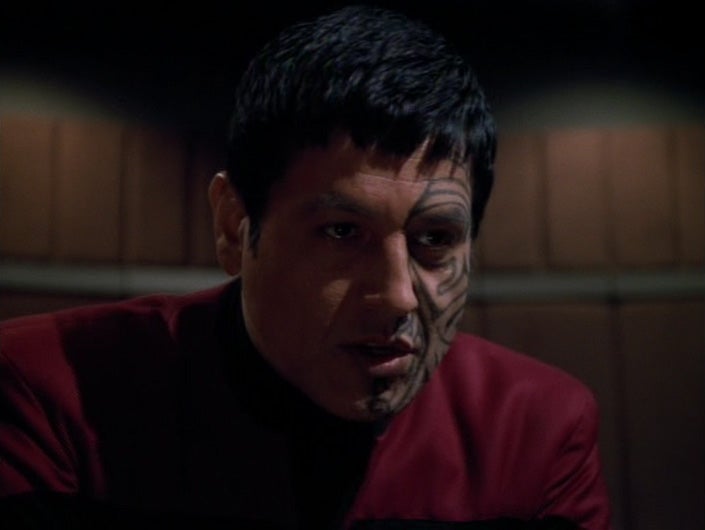
74) Living Witness (Star Trek: Voyager) - Hundreds of years after Voyager visit a planet, its crew are remembered as war criminals, as shown in a historical reenactment.
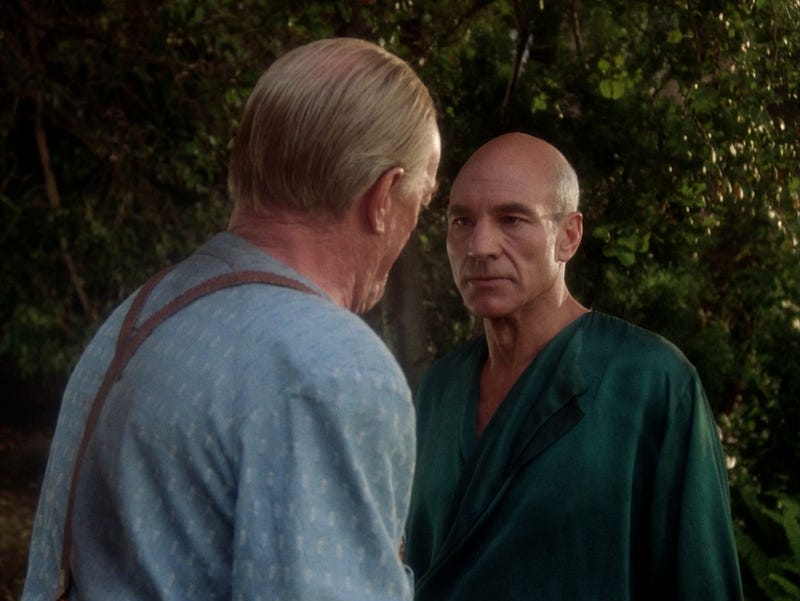
73) Family (Star Trek: The Next Generation) - This episode is revolutionary, purely because it shows the consequences of a big "event" episode — Picard is still shaken by his experiences with the Borg, when he goes home to visit his family.
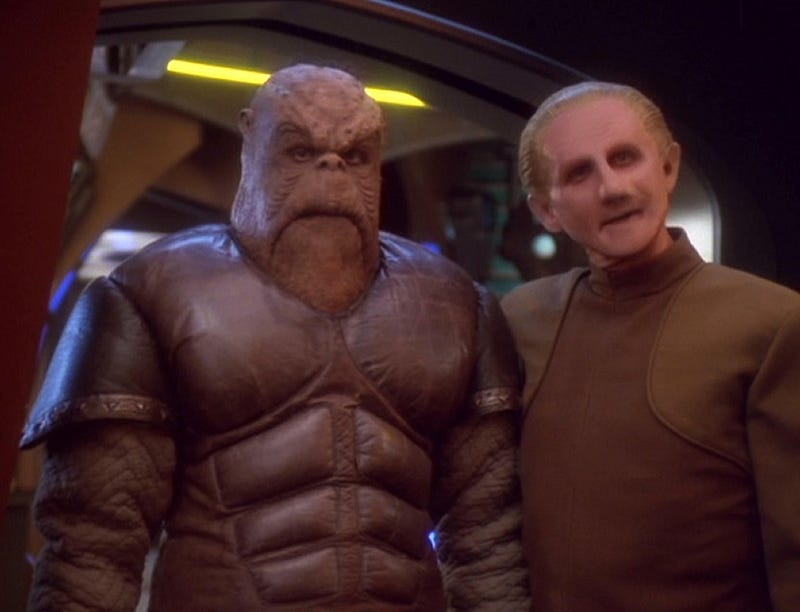
72) Who Mourns For Morn (Star Trek: Deep Space Nine) - The barfly who hangs out in Quark's bar has apparently died, but will Quark really inherit all his worldly goods?
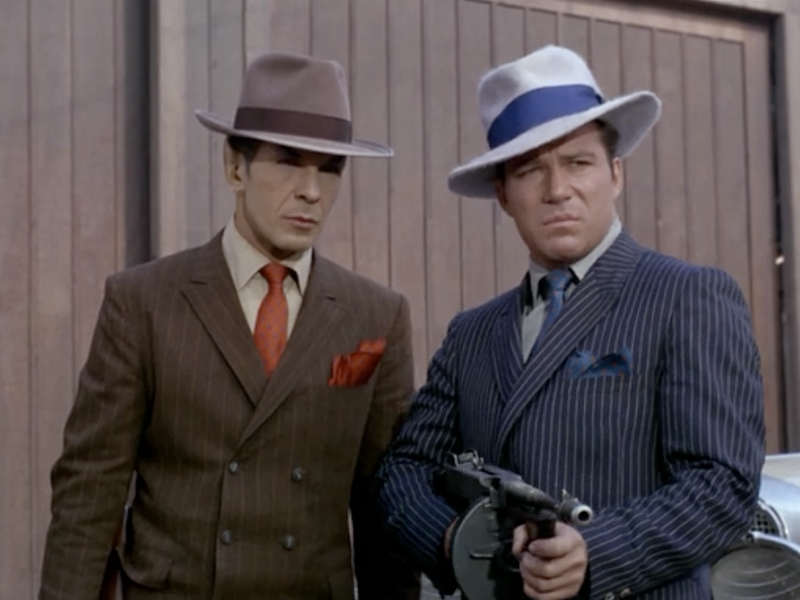
71) A Piece of the Action (Star Trek) - One of many "visiting Earth's past on another planet" episodes, this is the funniest and also the most trenchant. Kirk and friends have to outwit a whole planet of gangsters, while teaching them the arcane game of Fizzbin.
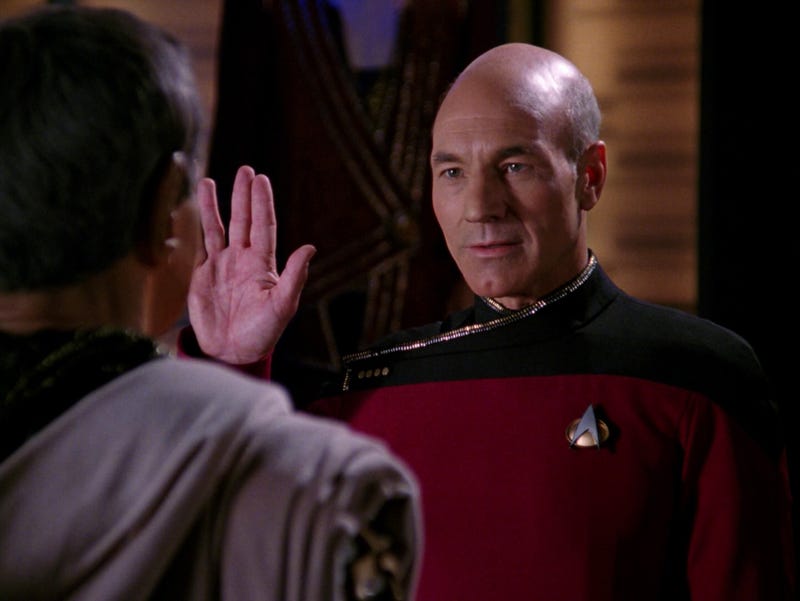
70) Sarek (Star Trek: The Next Generation) - Peter S. Beagle wrote this episode where Spock's father reappears, and he's not the Vulcan he used to be — a bittersweet exploration of aging and loss.
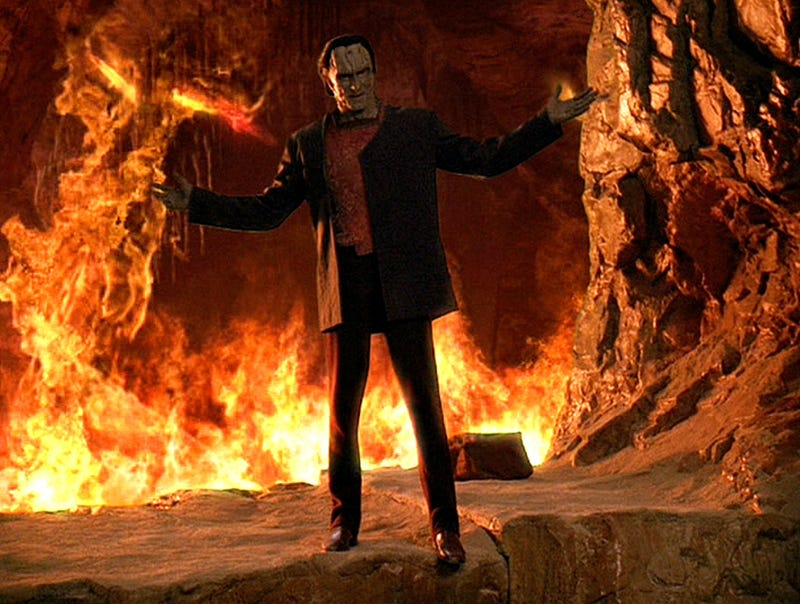
69) What You Leave Behind (Star Trek: Deep Space Nine) - The DS9 finale packs a lot of punches, including the final showdown with the Dominion, and Sisko embracing his destiny.
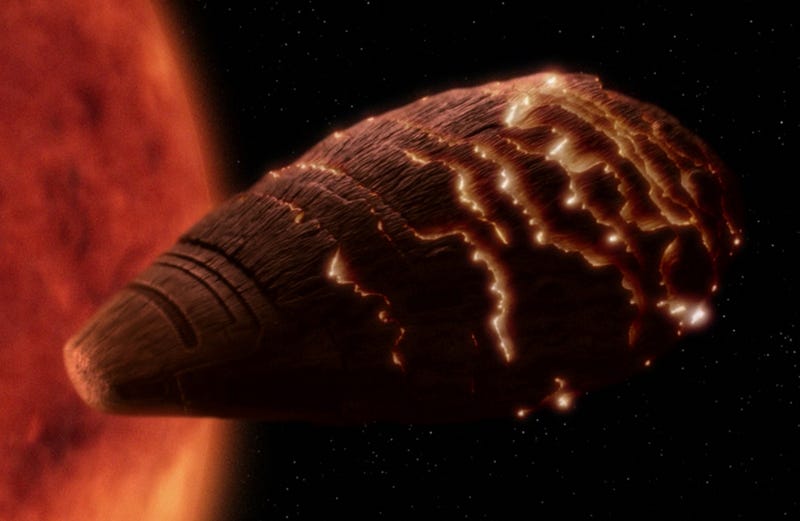
68) Tin Man (Star Trek: The Next Generation) - a powerful Betazoid telepath is obsessed with a giant sentient spaceship, but also develops a friendship with Data, the only person whose thoughts he can't read.
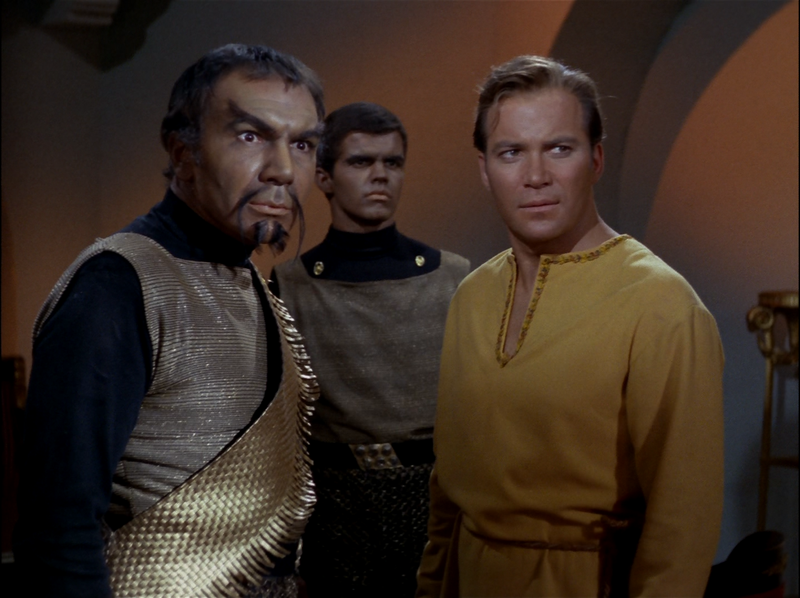
67) Errand of Mercy (Star Trek) - The first Klingon episode is also the most daring, as Kirk is portrayed as being nearly as warlike as his foes, in the face of godlike pacifist aliens.
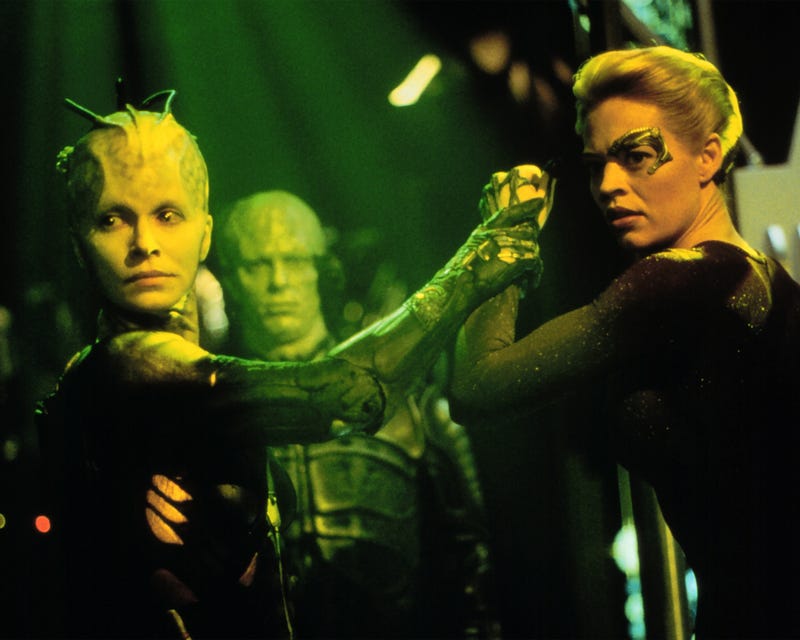
66) Dark Frontier (Star Trek: Voyager) - Seven of Nine starts to remember her past before she became a Borg drone, as Janeway schemes to steal from the Borg.
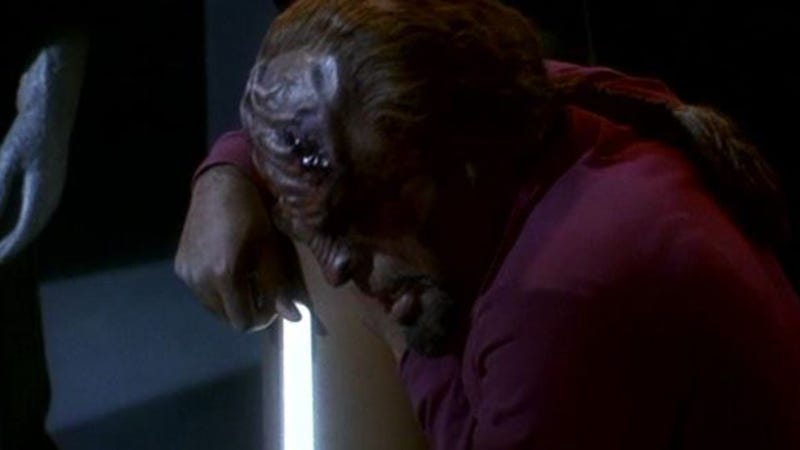
65) In Purgatory's Shadow/By Inferno's Light (Star Trek: Deep Space Nine) - One of the most shocking of the "Dominion War" storylines, this two-parter reveals a terrible secret about Bashir, and changes the balance of power in the Alpha Quadrant.
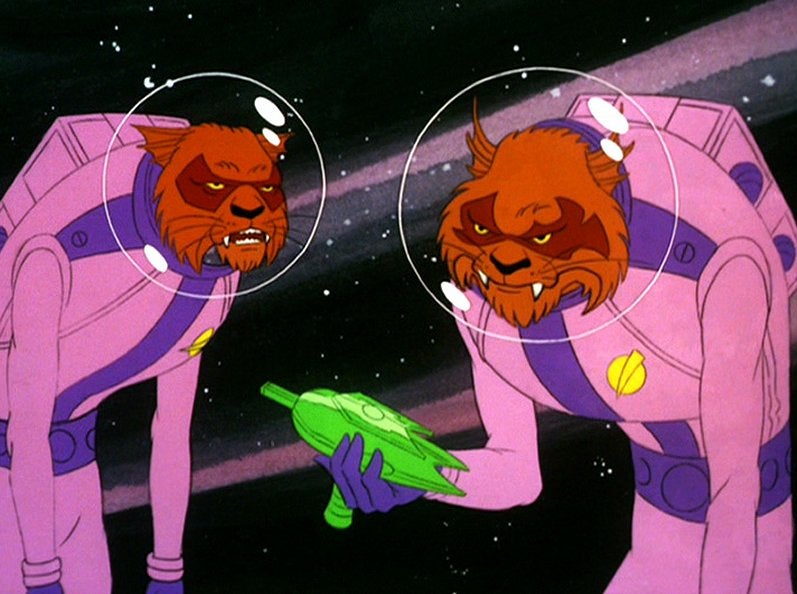
64) The Slaver Weapon (Star Trek: The Animated Series) - Written by Larry Niven, this episode sees the Enterprise crew meeting the Kzinti... and dealing with a self-aware ultimate weapon.
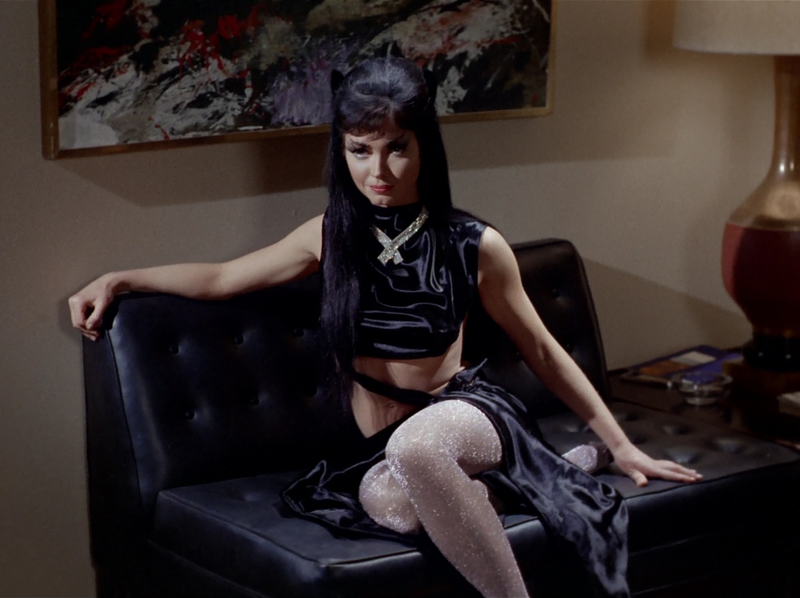
63) Assignment: Earth (Star Trek) - Kirk and Spock go back to the 1960s, but they're not the only interloper. This was the "backdoor pilot" for a spin-off show that never happened, but it's still bizarrely entertaining in its own right.
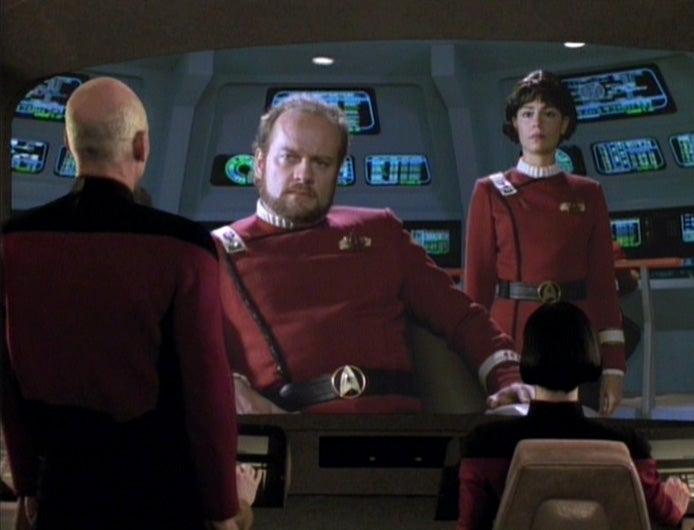
62) Cause and Effect (Star Trek: The Next Generation) - The one where the Enterprise keeps blowing up over and over. The most explosive, bewildering time loop ever.
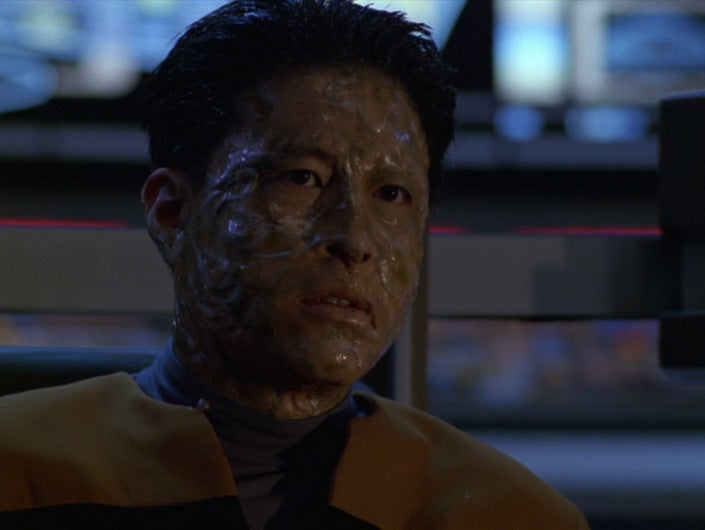
61) Course: Oblivion (Star Trek: Voyager) - These alternate versions of a starship crew aren't evil — just very, very fragile. This is one of those episodes whose nihilism makes it almost like a weird dream.
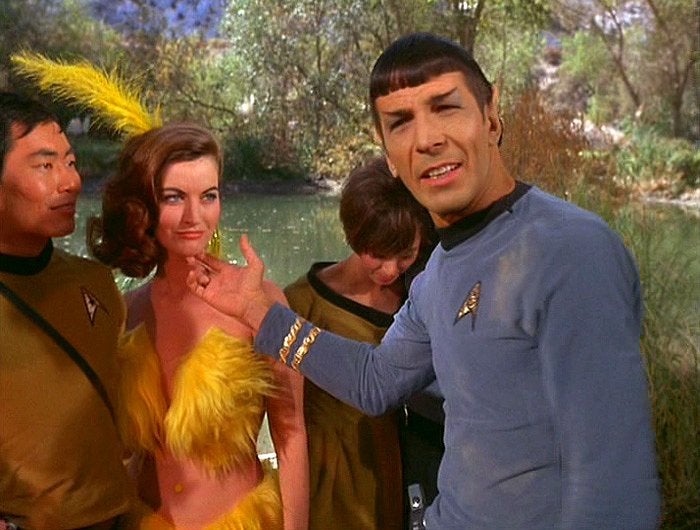
60) Shore Leave (Star Trek) - One of the goofiest original-series episodes also has a major dark side, as the crew arrives on a planet where anything they imagine can become real. Anything.
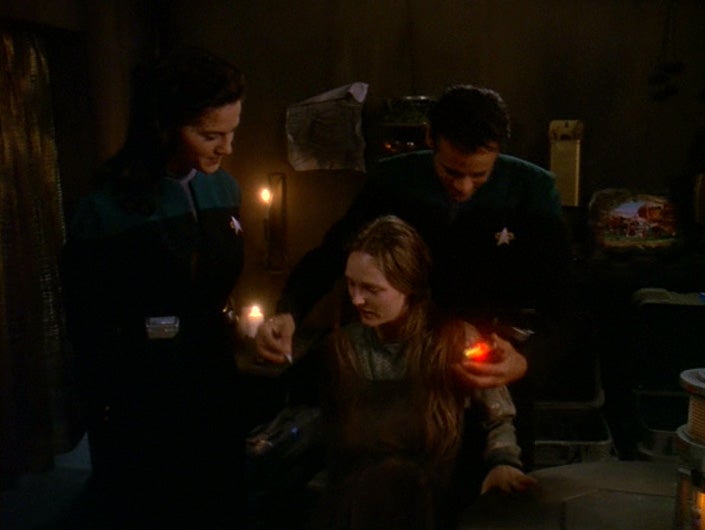
59) The Quickening (Star Trek: Deep Space Nine) - Dr. Bashir's miracle-worker image faces an extra challenge when he faces a genetically-engineered plague.
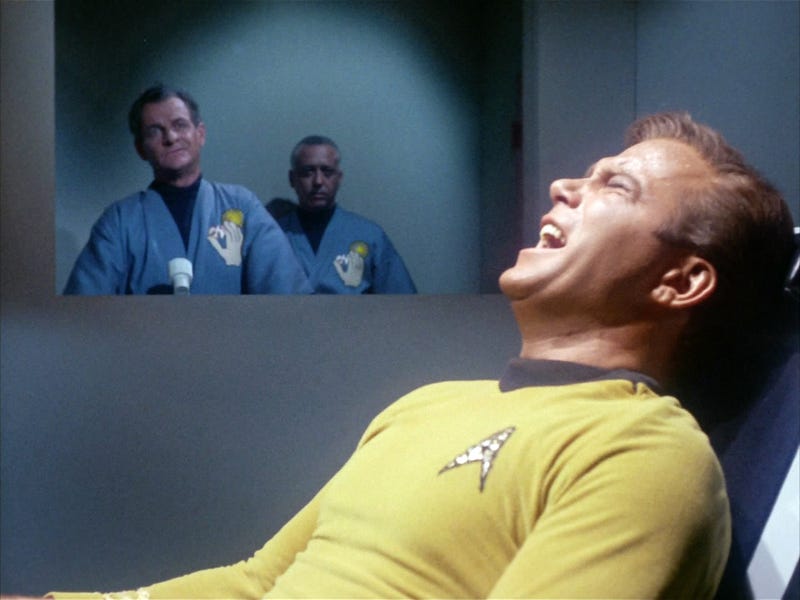
58) Dagger of the Mind (Star Trek) - In the Federation's utopian future, the rehabilitation of criminals is much more humane. Much, much more humane. The psychological cruelty in this one is actually pretty intense.
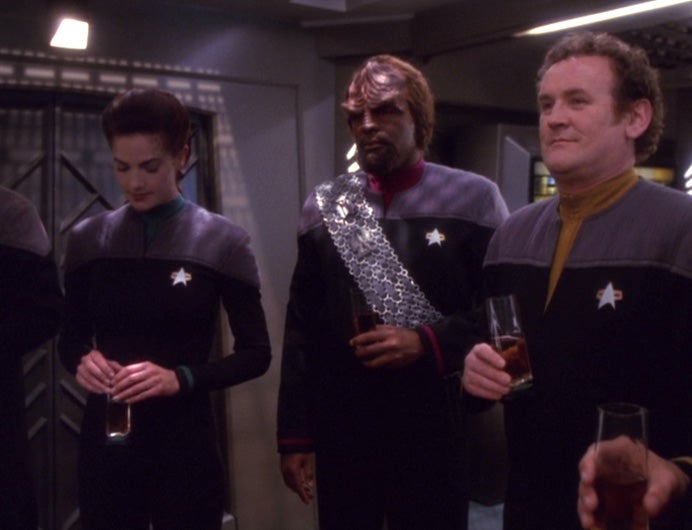
57) The Sound of Her Voice (Star Trek: Deep Space Nine) - Everybody falls in love with a stranded Starfleet captain who's sent out a distress call. But can she be saved?
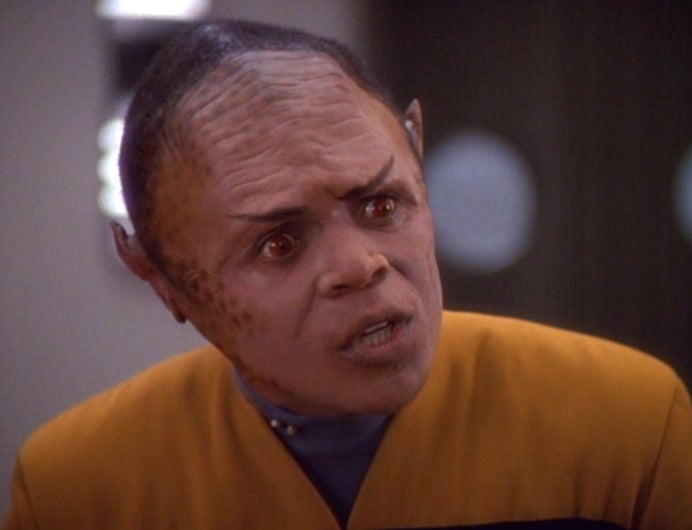
56) Tuvix (Star Trek: Voyager) - The Voyager crew face another huge ethical conundrum... and arguably, this time they choose wrong.
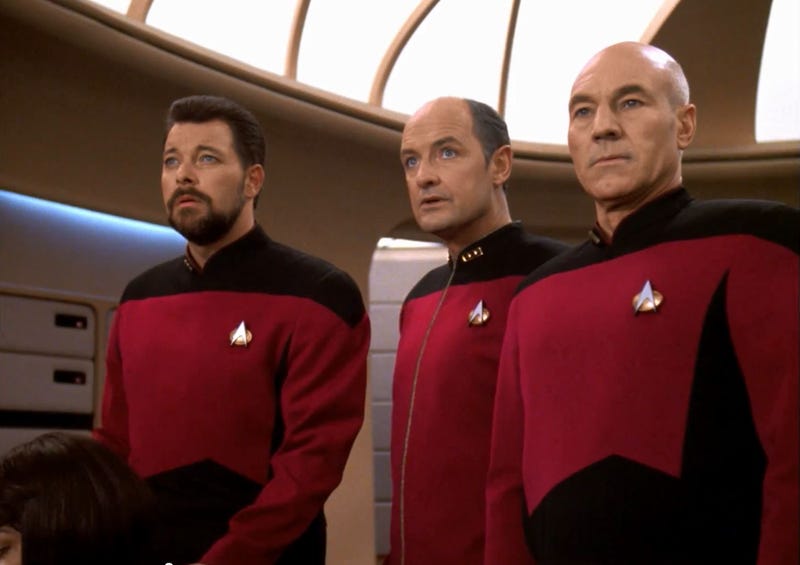
55) The Pegasus (Star Trek: The Next Generation) - Riker's long-buried secret comes to light, and he's forced to lie to Captain Picard.
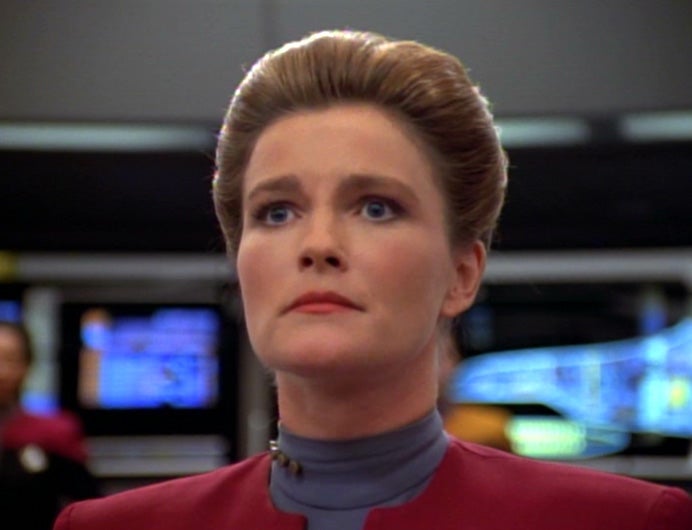
54) Caretaker (Star Trek: Voyager) - Greg Cox argued (in our comments) this is the best first episode of any Trek, and he has a point: it shows Captain Janeway making two tough choices: stranding her crew, and adopting a crew of rebels.
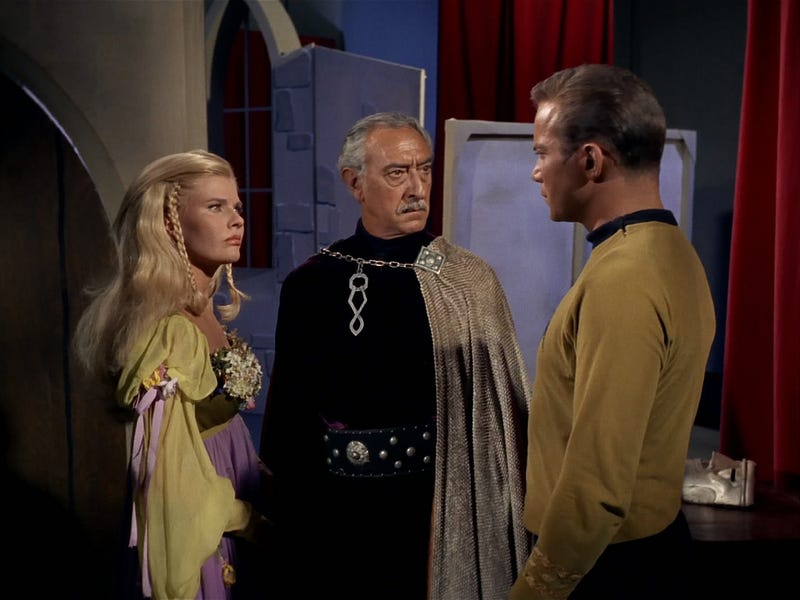
53) The Conscience of the King (Star Trek) - This episode about a Shakespearean actor who may be a legendary mass murderer is also our first glimpse of the flaws in Trek's perfect future.
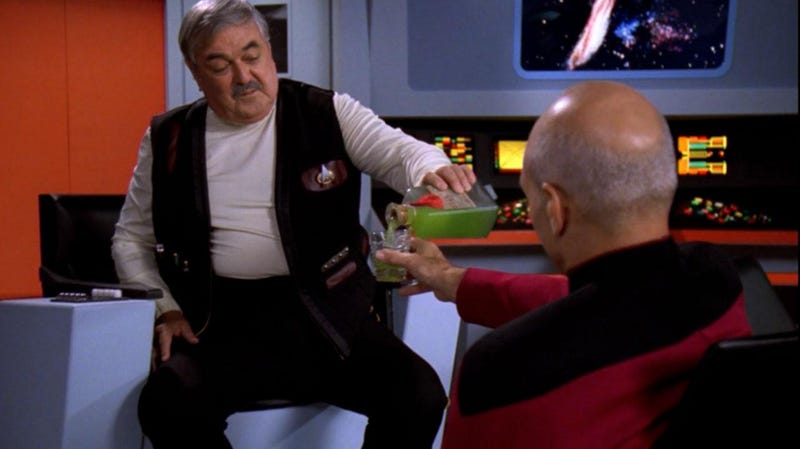
52) Relics (Star Trek: The Next Generation) - Old Starfleet engineers never die — they just come back decades later, eager to tinker with another warp engine.
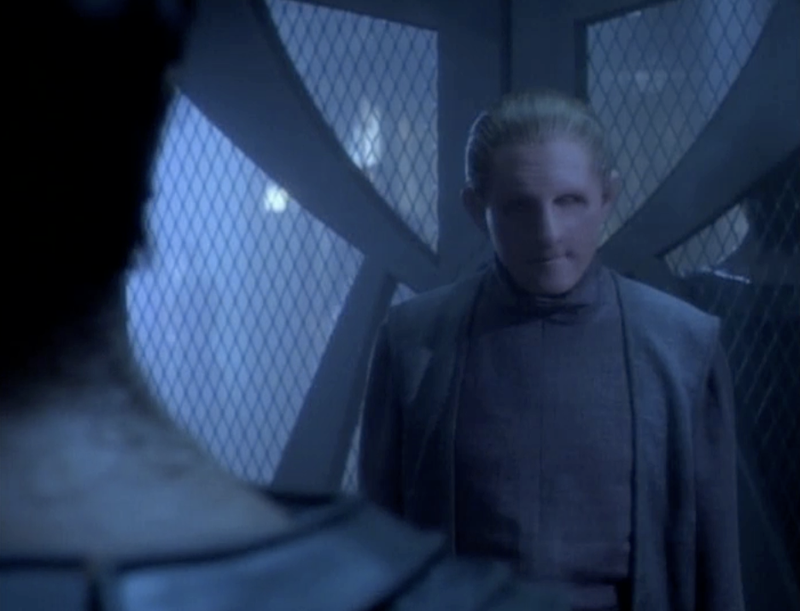
51) Necessary Evil (Star Trek: Deep Space Nine) - The best of the episodes about the shapeshifting Odo doing detective work, because his digging turns out to reveal some dark secrets.
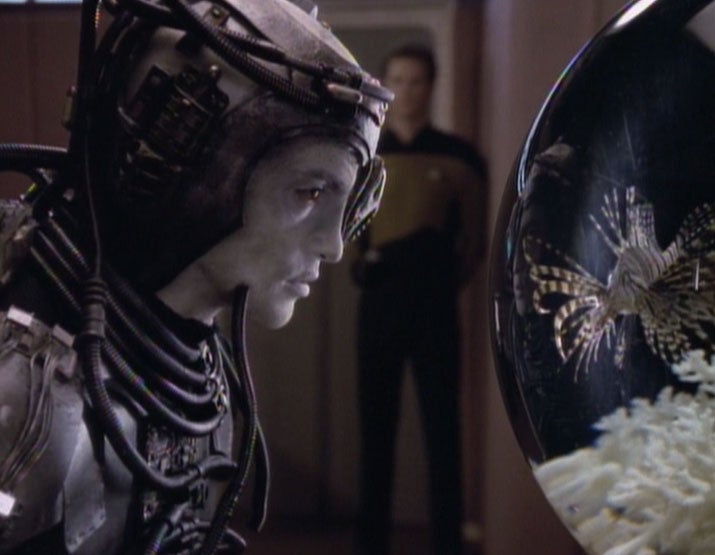
50) I Borg (Star Trek: The Next Generation) - Another episode with a guest star who poses a huge ethical question — the Enterprise finds a disconnected Borg drone, and tries to turn him into a weapon.
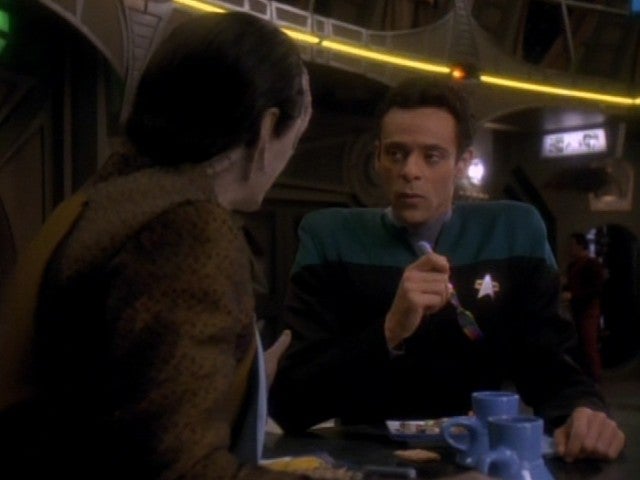
49) The Wire (Star Trek: Deep Space Nine) - The mysterious Garak finally has to reveal a little bit about his past to his friend Dr. Bashir, to save his life — but which stories are lies, and which ones are true? Or is there really any difference?
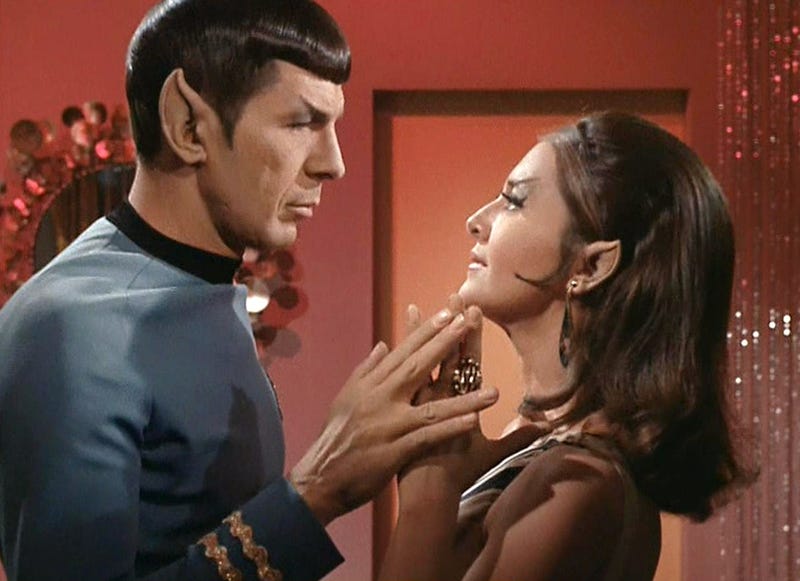
48) The Enterprise Incident (Star Trek) - Kirk and Spock pull an elaborate hustle on the Romulans, in an episode that shows just how unethical our heroes are prepared to be.
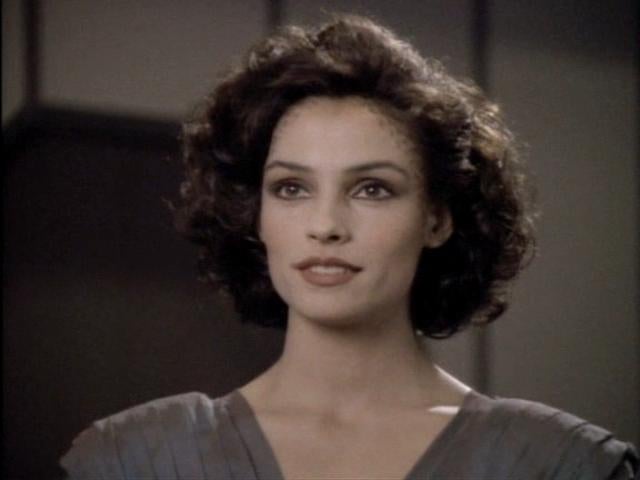
47) Perfect Mate (Star Trek: The Next Generation) - Picard falls for a woman (Famke Janssen!) who is destined to marry a warlord in an arranged marriage, and he has to put his feelings aside for the sake of peace.
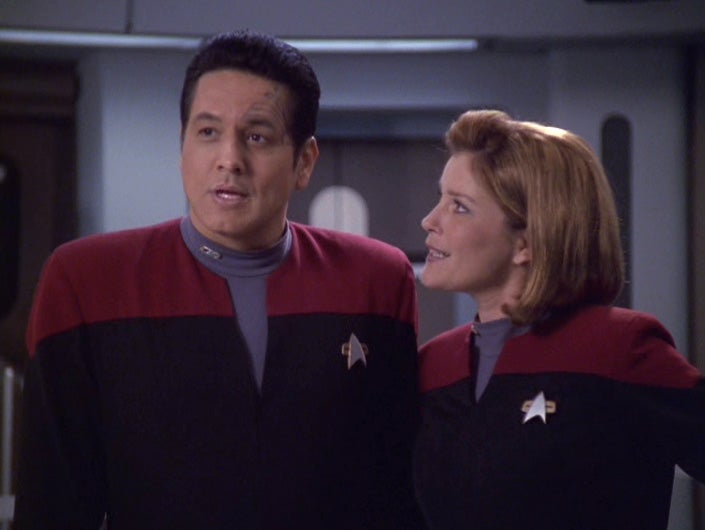
46) Blink of an Eye (Star Trek: Voyager) - In yet another high-concept Voyager outing, the starship appears in the sky over a planet for a relatively brief time, but that's long enough for it to loom over the life and death of an entire civilization.
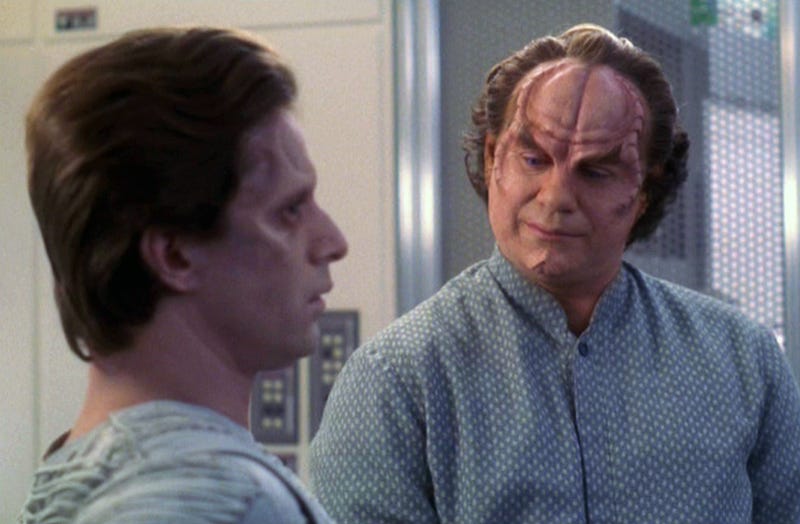
45) Dear Doctor (Enterprise) - Doctor Phlox relates his experience dealing with a plague affecting a relatively primitive planet, which turns out to pose an impossible dilemma.
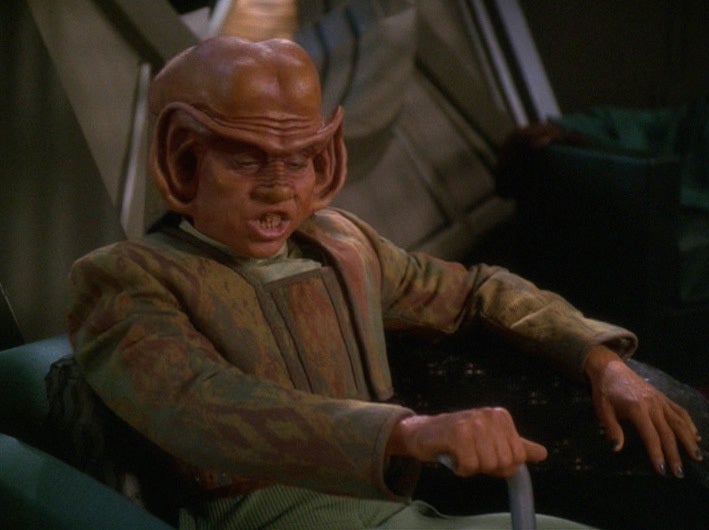
44) It's Only a Paper Moon (Star Trek: Deep Space Nine) - Like "Family," this is an episode that takes a hard look at the process of recovering from trauma... and doesn't sugar-coat the truth.
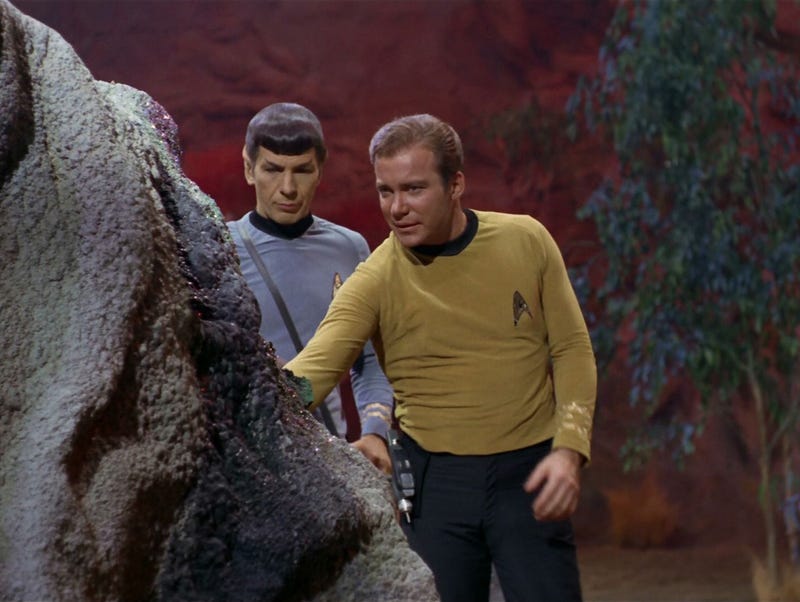
43) Obsession (Star Trek) - Kirk's judgment is called into question when he becomes fixated on revenge, showing once again just how dangerous an out-of-control captain can be.
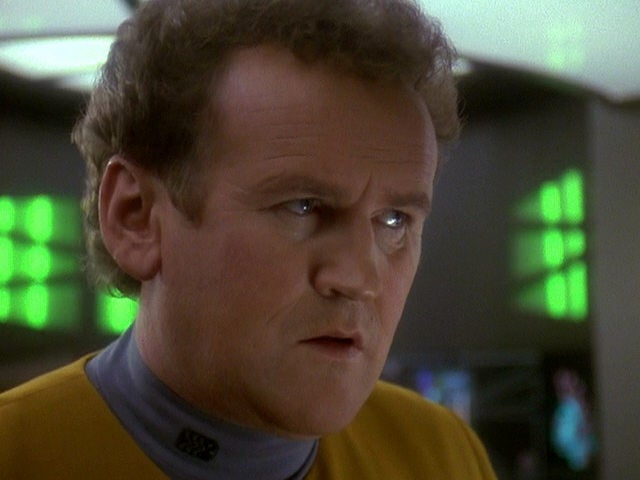
42) Hard Time (Star Trek: Deep Space Nine) - The best of the many "Let's torture O'Brien" episodes, in which he receives false memories of 20 years of imprisonment.
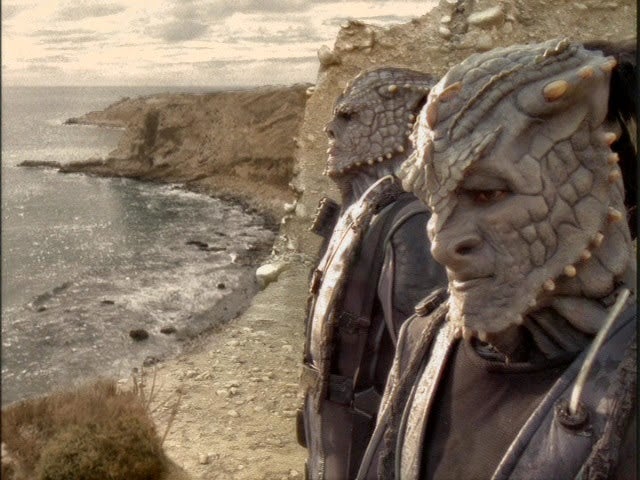
41) Rocks and Shoals (Star Trek: Deep Space Nine) - Sisko's crew are stranded on a planet with some of the enemy Jem'Hadar... and the Jem'Hadar's unquestioning drug-induced loyalty is put to the test, horribly.
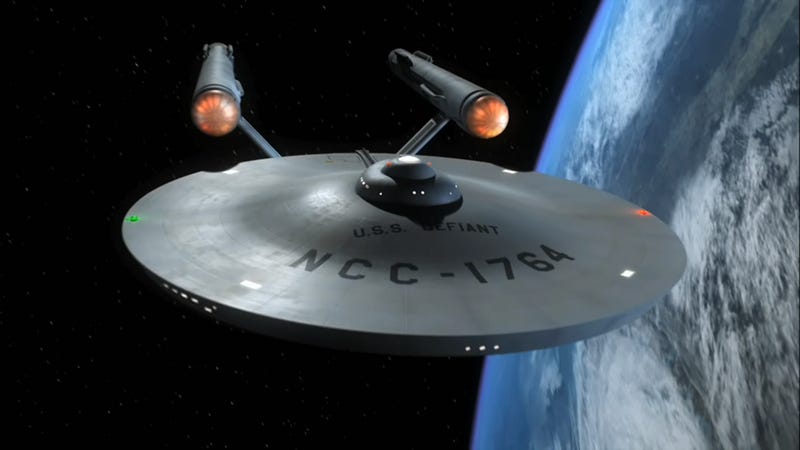
40) In A Mirror Darkly, Parts 1 & 2 (Enterprise) - The best of the "Mirror Universe" sequels, this episode shows us a more unscrupulous version of Jonathan Archer... who's just inherited a Federation ship from the future.
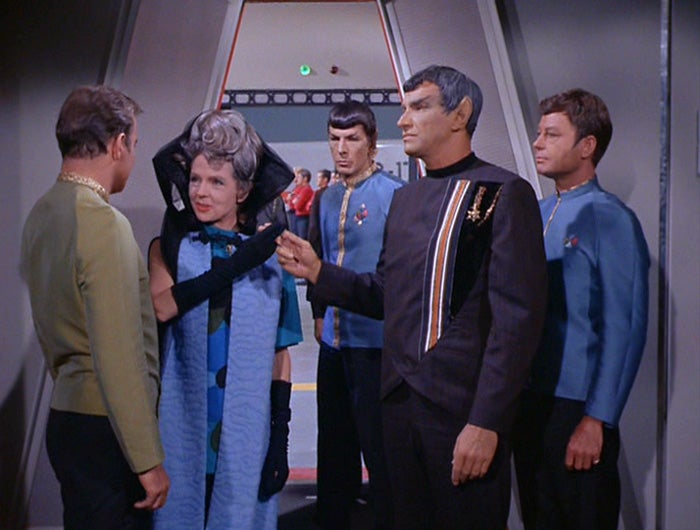
39) Journey to Babel (Star Trek) - Most notable for introducing us to Spock's parents, this episode also shows a Federation diplomatic mission gone horribly wrong.
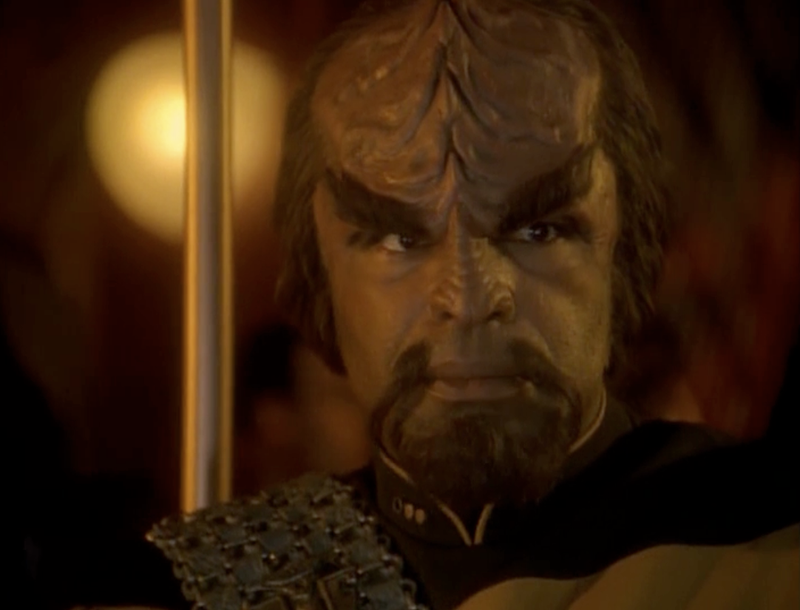
38) The Way of the Warrior (Star Trek: Deep Space Nine) - With the Federation facing war with the Dominion, it's a good thing the Klingons are here to help. Except sometimes your allies can be more dangerous than your enemies.
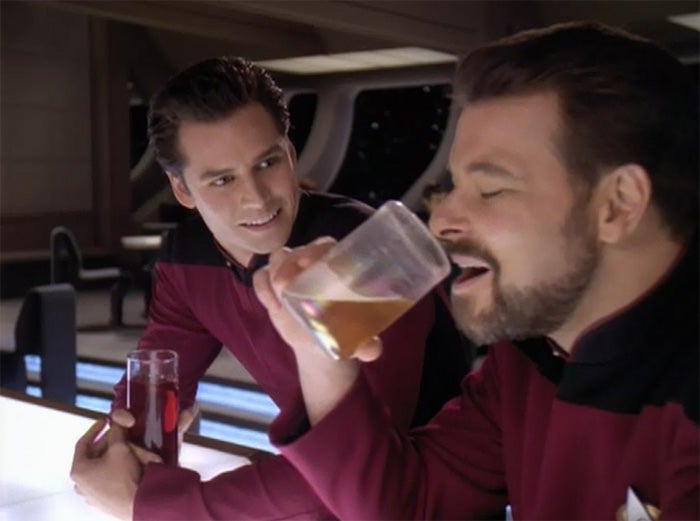
37) Lower Decks (Star Trek: The Next Generation) - This episode follows four junior officers aboard the Enterprise, and lets us see the command staff through the eyes of their underlings.
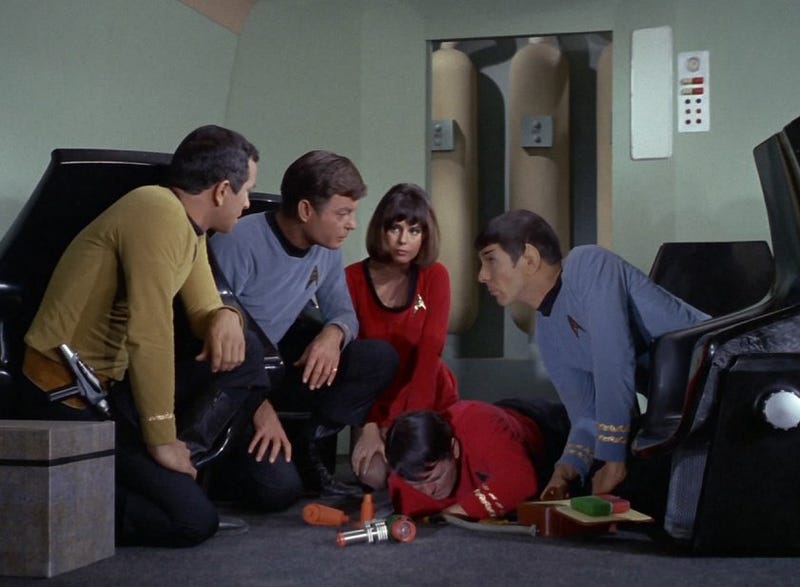
36) Galileo Seven (Star Trek) - A shuttlecraft full of people is stranded on a planet, and it appears that not all of them can survive. Good thing Spock is in charge, and he has zero hesitation about making the tough call... Right?
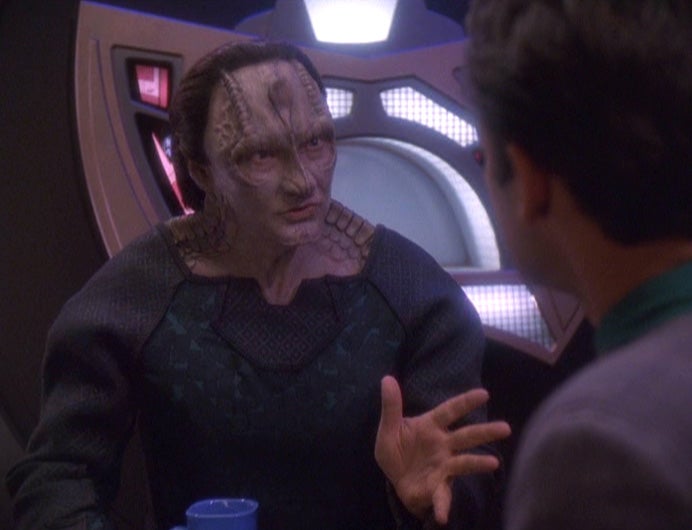
35) Inter Arma Silent Leges (Star Trek: Deep Space Nine) - Bashir has always wanted to play at being a spy... so how does he like doing it in real life? One of the episodes that exposes the terrible underbelly of the Federation.
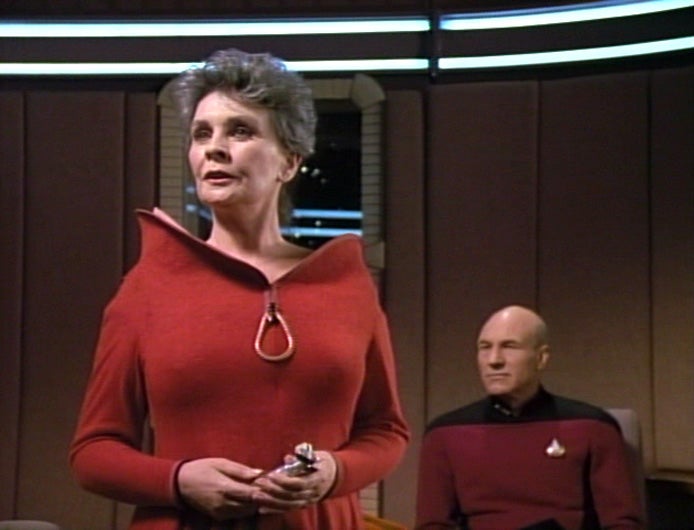
34) The Drumhead (Star Trek: The Next Generation) - An Admiral subjects the Enterprise to an inquisition, and starts finding conspiracies behind every bulkhead, providing an object lesson in the dangers of paranoia.
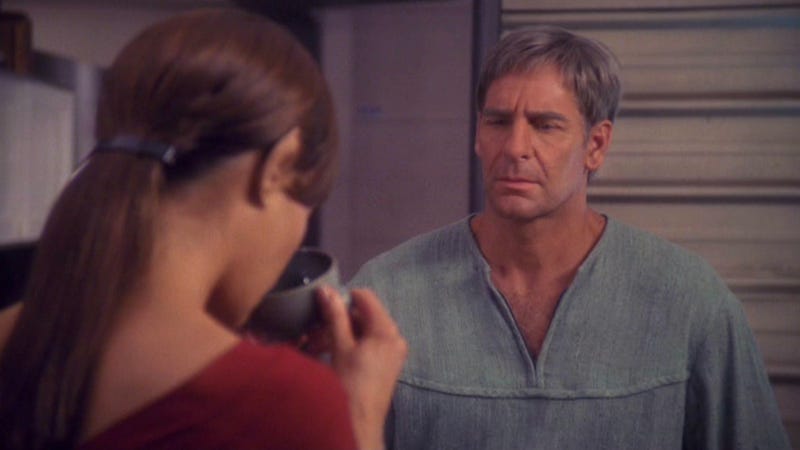
33) Twilight (Enterprise) - In the future, Archer has dementia, and the human race has lost a devastating war. And both things are equally terrible to behold.
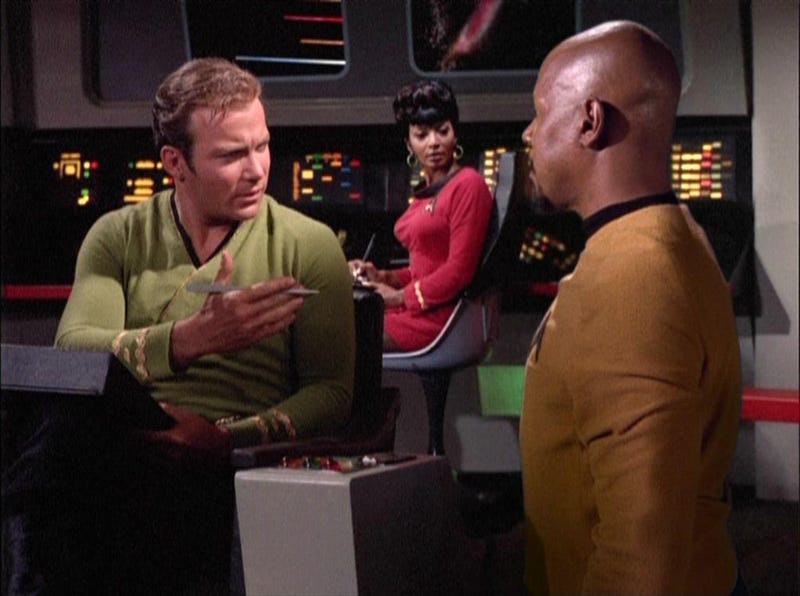
32) Trials and Tribble-ations (Star Trek: Deep Space Nine) - One of several time-travel episodes, this one sends Sisko's officers back to the original series episode "The Trouble With Tribbles," and provides a great love letter to Trek's history.
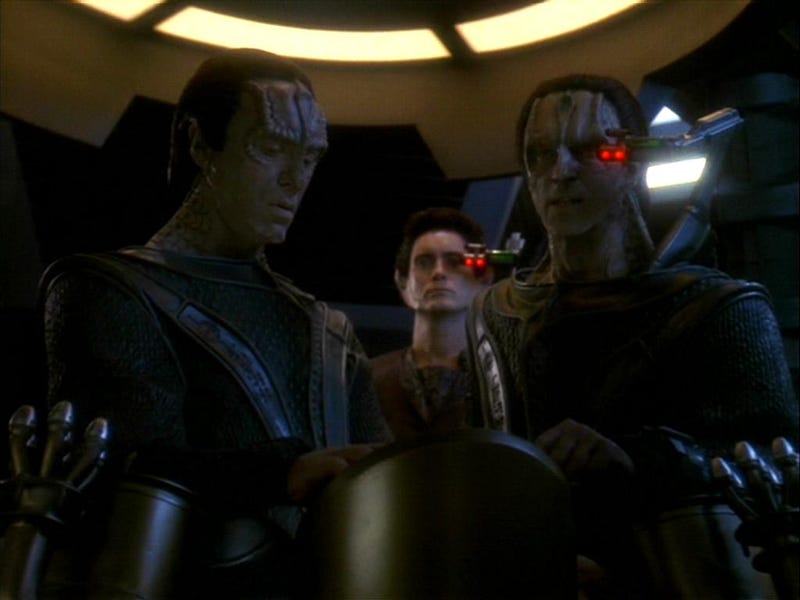
31) Call to Arms (Star Trek: Deep Space Nine) - This is the one where Sisko makes the tough choices, and a highly symbolic baseball is the only hint of Sisko's endgame.
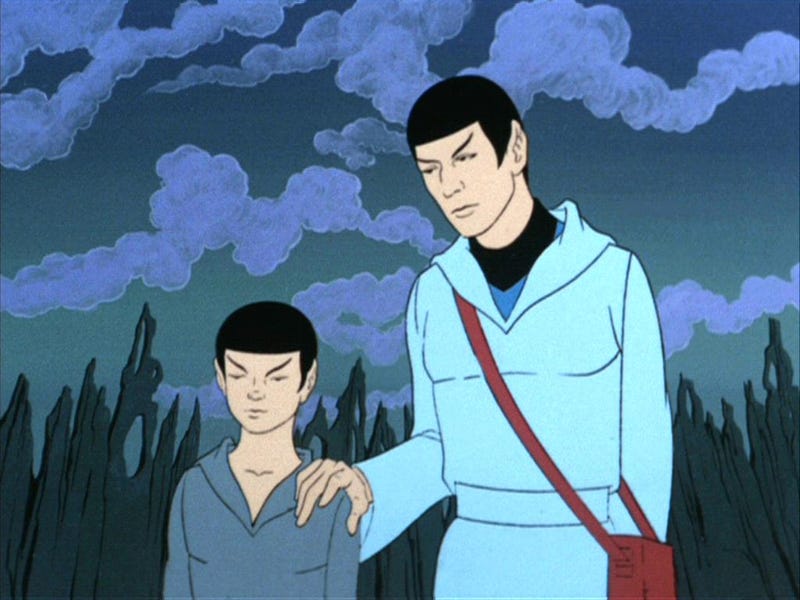
30) Yesteryear (Star Trek: The Animated Series) - Spock travels back in time and saves himself as a young boy on Vulcan, in an episode that reveals a lot about Spock's life.
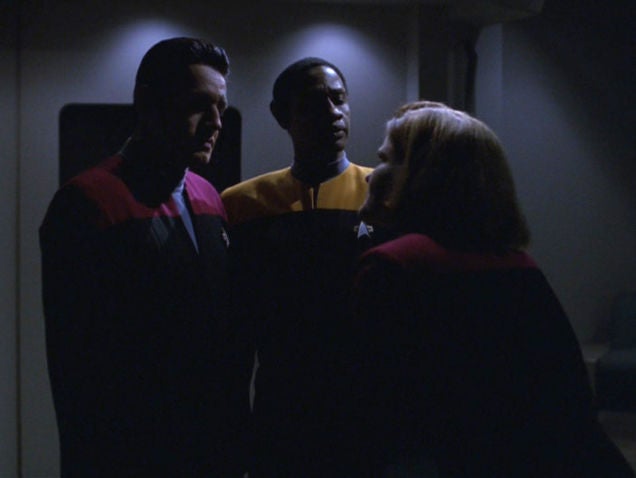
29) The Void (Star Trek: Voyager) - When Voyager gets trapped in a pocket space with a bunch of other ships that prey on each other, Janeway has to convince everybody to work together to escape. Janeway's finest hour.
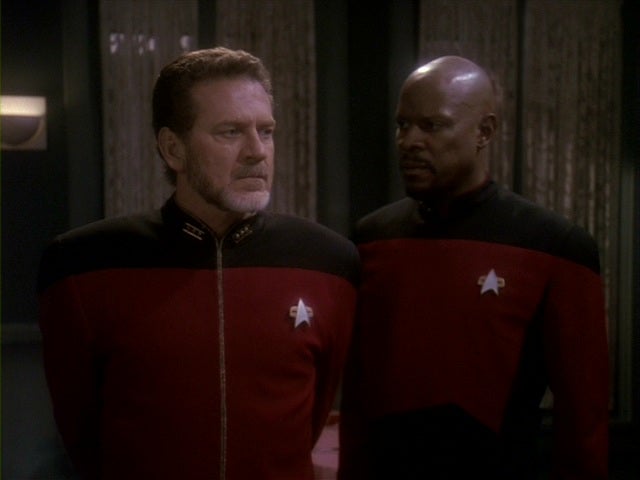
28) Homefront/Paradise Lost (Star Trek: Deep Space Nine) - Nowadays, everybody trots out the "security versus freedom" question, but DS9 asked it first, and best, with this story of paranoia about shapeshifters in Starfleet.
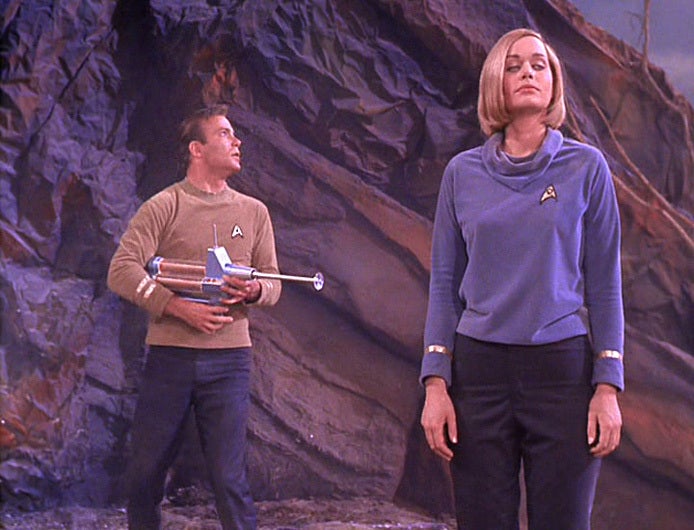
27) Where No Man Has Gone Before (Star Trek) - The second Star Trek pilot is the best, facing Kirk with an impossible choice: condemn his friend to death, or risk his entire ship.
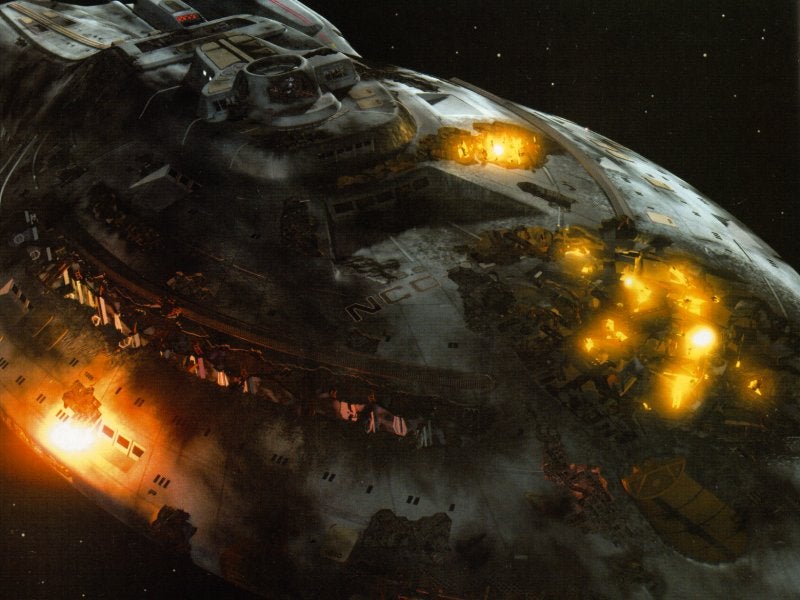
26) The Year of Hell Parts 1 &2 (Star Trek: Voyager) - The luckiest ship in the Delta Quadrant finally has really, really bad luck.
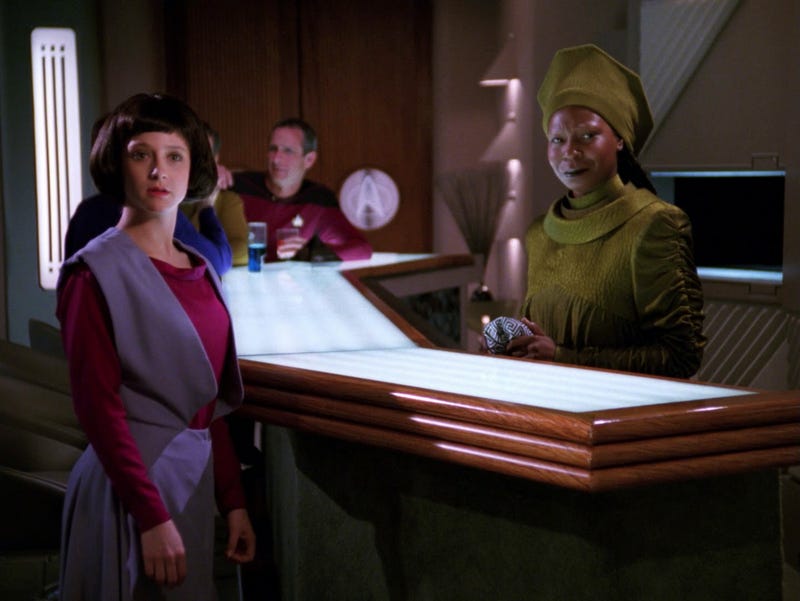
25) The Offspring (Star Trek: The Next Generation) - Data creates an android daughter for himself, but some miracles are too great to last.
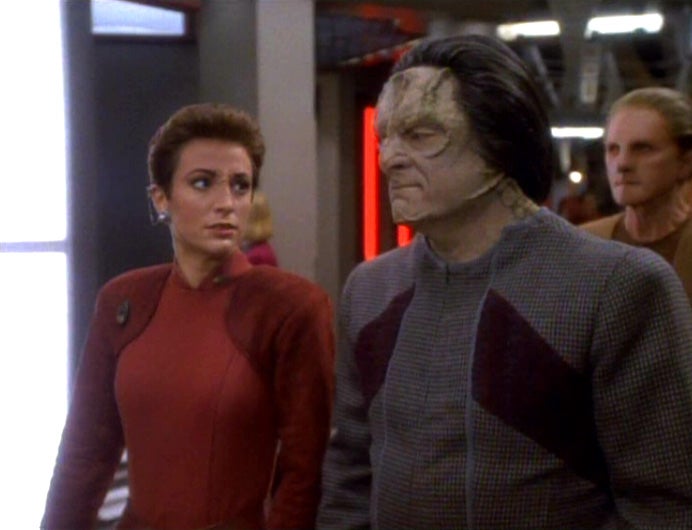
24) Duet (Star Trek: Deep Space Nine) - Kira suspects that a visiting Cardassian is actually a notorious war criminal, and she's willing to go to insane lengths to prove it.
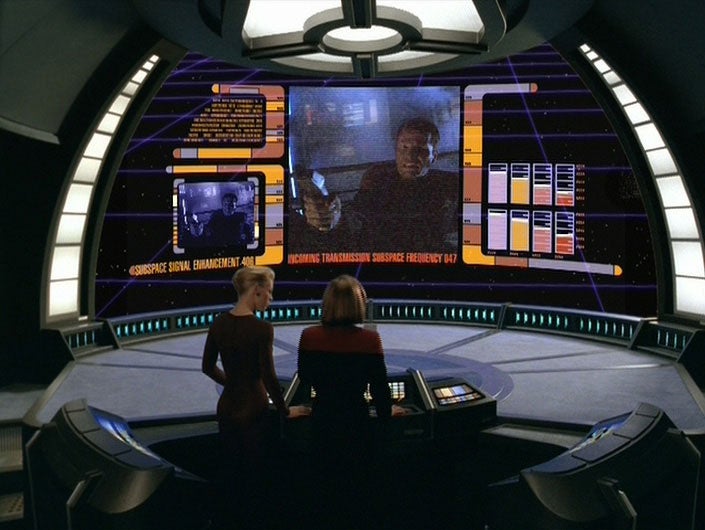
23) The Equinox (Star Trek: Voyager) - Captain Janeway's determination to uphold Federation principles far from home looks a lot more impressive when you meet another Starfleet crew that compromised, really badly.
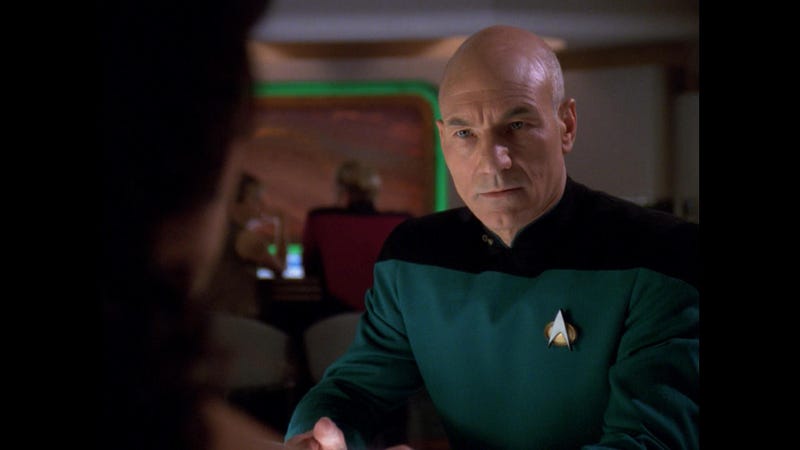
22) Tapestry (Star Trek: The Next Generation) - Picard is dying of an old wound caused by his recklessness, so Q shows him what his life would be like if he'd played it safe.
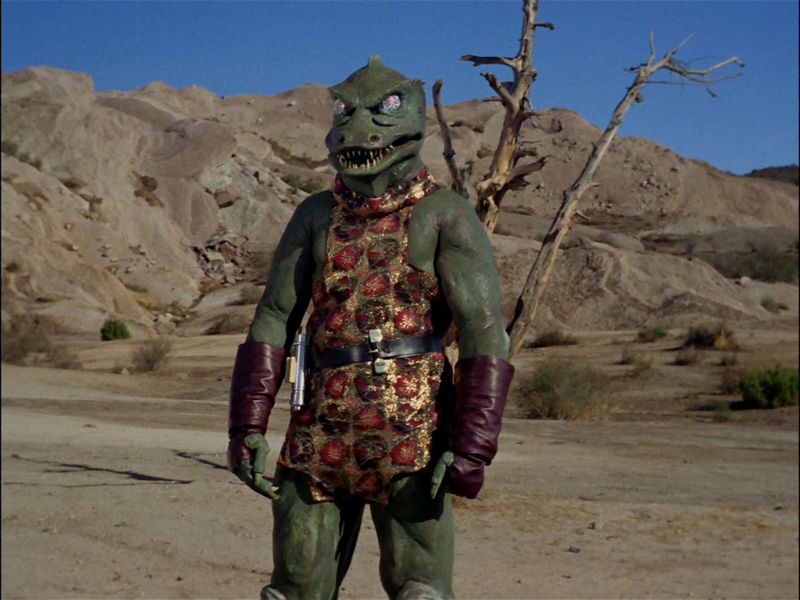
21) Arena (Star Trek) - Kirk faces two impossible challenges: making a weapon from scratch, and upholding his values in the face of a murderous Gorn.
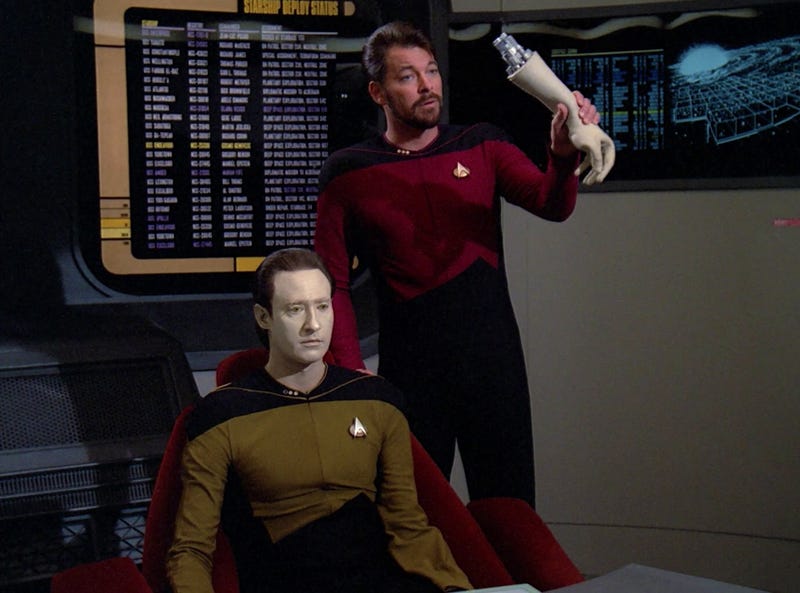
20) Measure of a Man (Star Trek: The Next Generation) - Putting Data on "trial" to see if he's a person raises fascinating questions, but the best part is Riker's total ruthlessness as prosecutor.
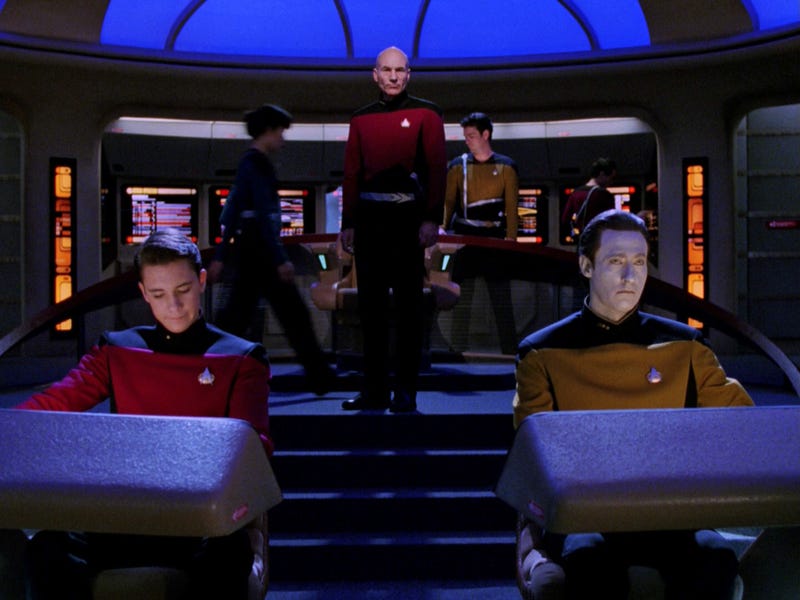
19) Yesterday's Enterprise (Star Trek: The Next Generation) - The Enterprise finds itself in an alternate universe, and restoring the original timeline will come at a high cost.
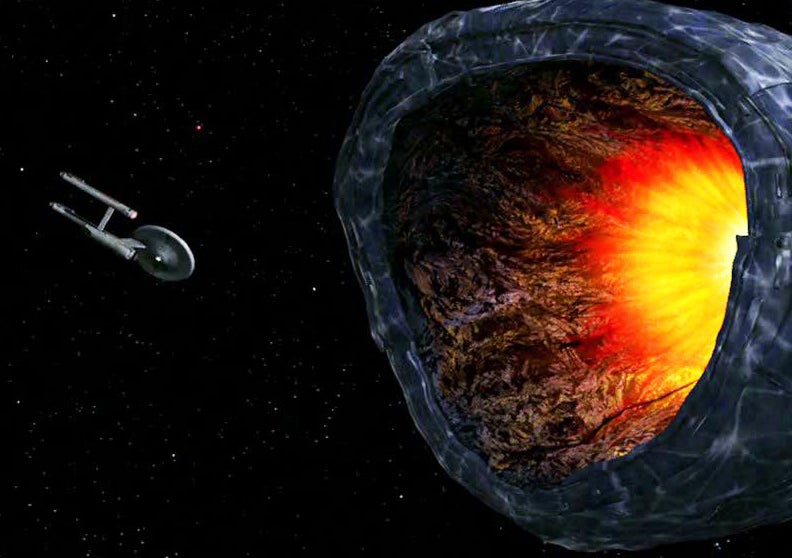
18) The Doomsday Machine (Star Trek) - Kirk faces the ultimate weapon, but his real nightmare is an unhinged superior officer taking command of the Enterprise.
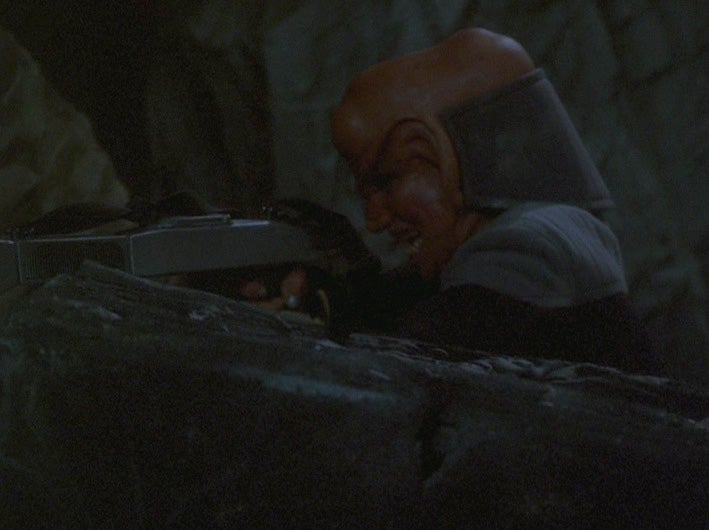
17) The Siege of AR-558 (Star Trek: Deep Space Nine) - Lots of DS9 episodes explored the notion that war is Hell, but this one made it visceral and unforgettable.
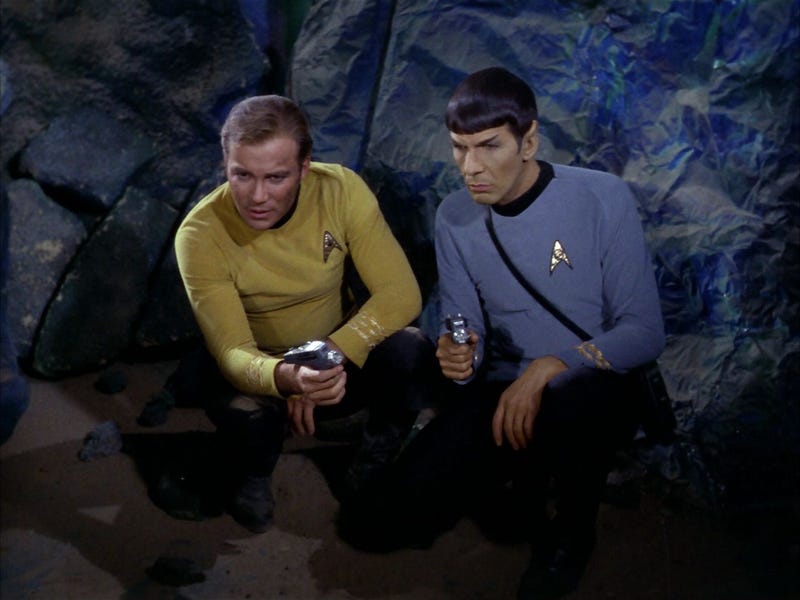
16) Devil in the Dark (Star Trek) - The classic Star Trek scenario: a story in which the "monster" is misunderstood, and ignorant humans are the real danger.
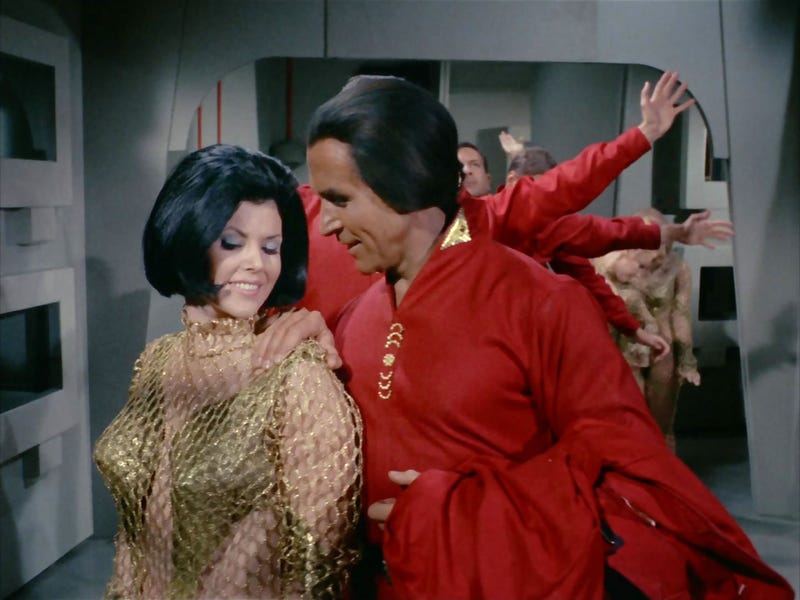
15) Space Seed (Star Trek) - The only Trek episode to get a movie sequel, this story introduces a suave former dictator who's a perfect foil for Kirk.
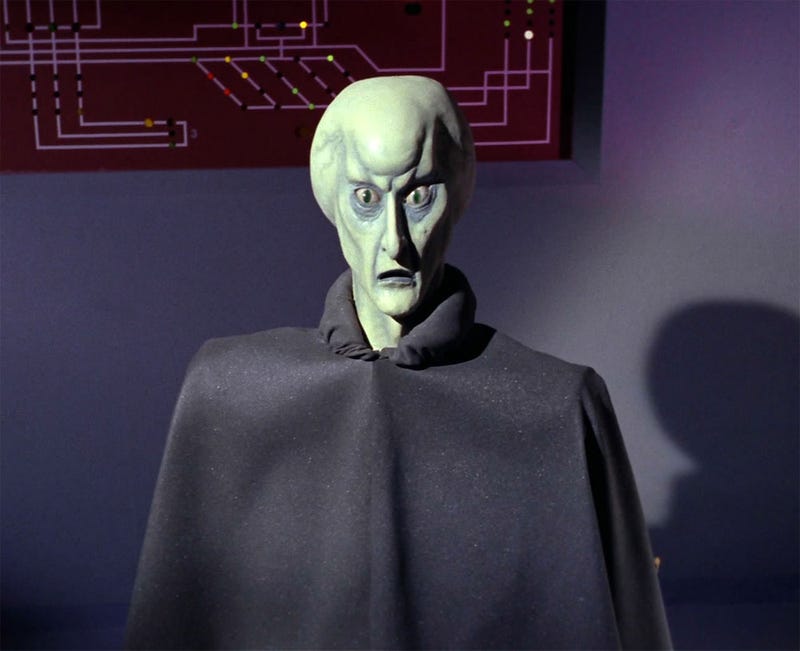
14) The Corbomite Maneuver (Star Trek) - This episode isn't named after the villain or the McGuffin, but after Kirk's cunning gambit — with good reason. Never play poker with Kirk.
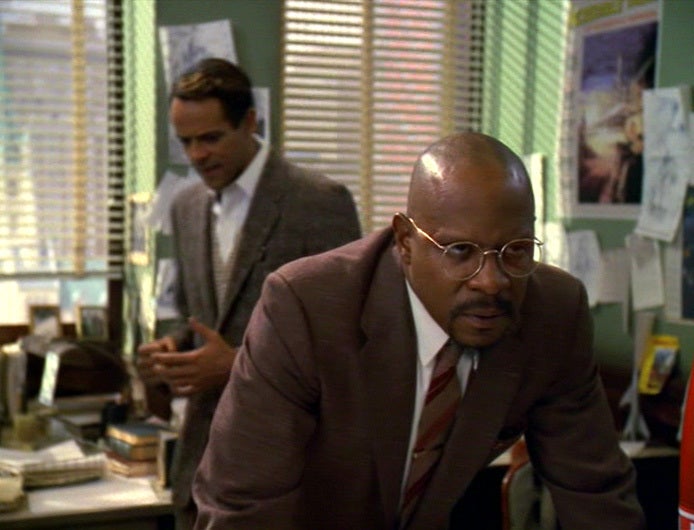
13) Far Beyond The Stars (Star Trek: Deep Space Nine) - Sisko hallucinates he's a pulp science fiction author writing about the impossible: a black captain named Ben Sisko.
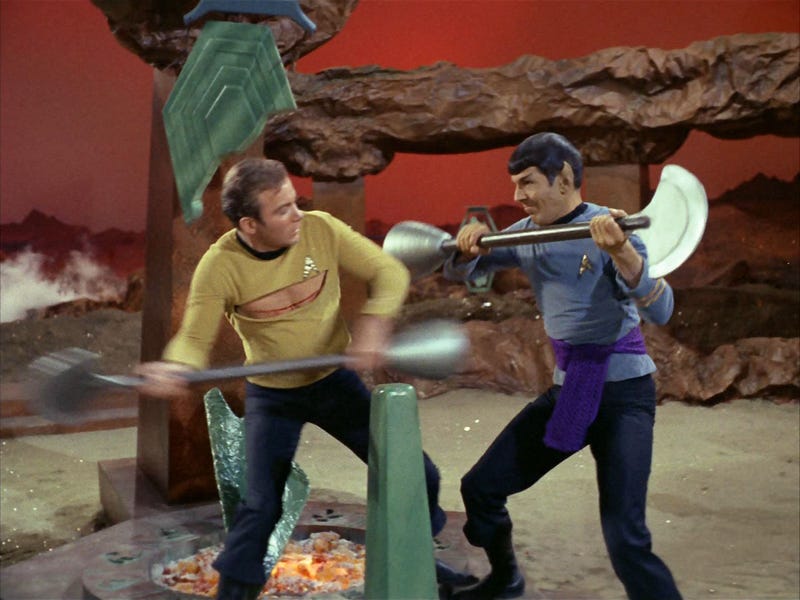
12) Amok Time (Star Trek) - Our first visit to Spock's homeworld also shows how friendship and cunning are more powerful than mating rituals and ancient traditions.
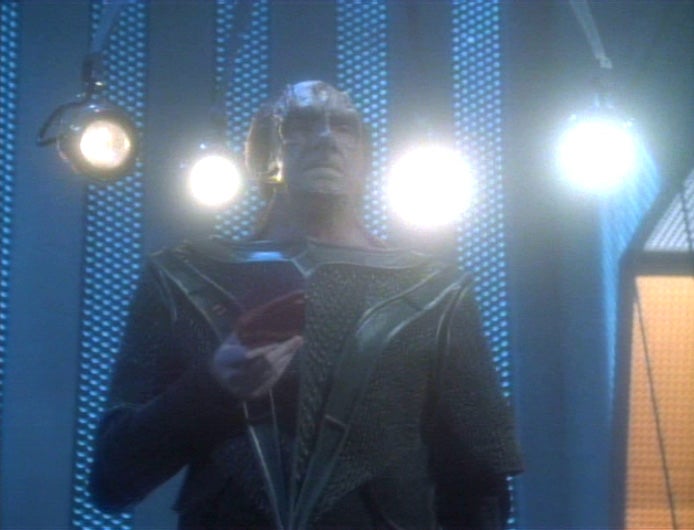
11) Chain of Command (Star Trek: The Next Generation) - Picard is captured by a ruthless Cardassian torturer — and gets pushed to his limits.
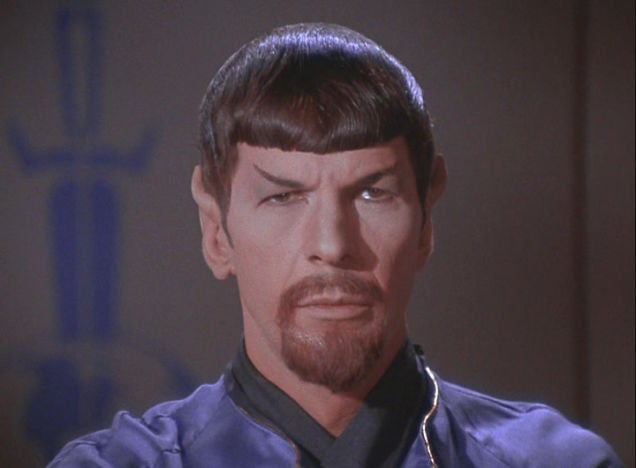
10) Mirror, Mirror (Star Trek) - Meeting alternate crewmembers, including Bearded Spock, is cool — but the fascinating part is seeing our heroes try to pretend to be barbarians.
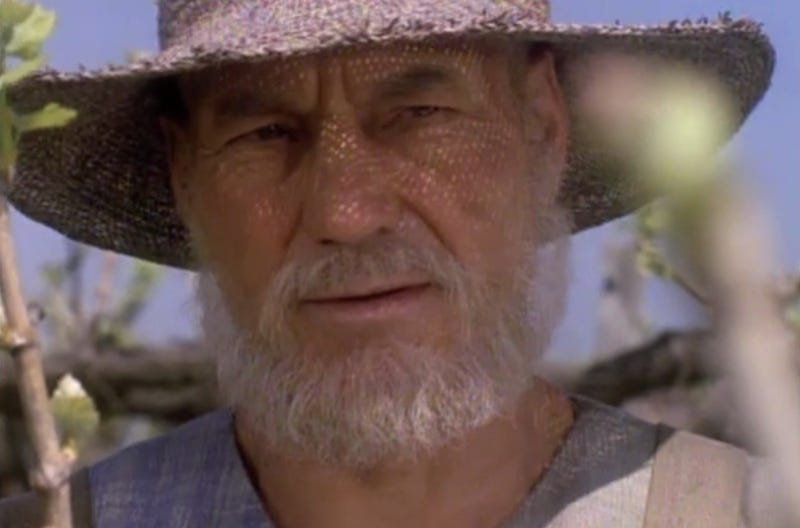
9) All Good Things (Star Trek: The Next Generation) - The best Q story sees Picard tested at three points in his life, with the whole universe in the balance.
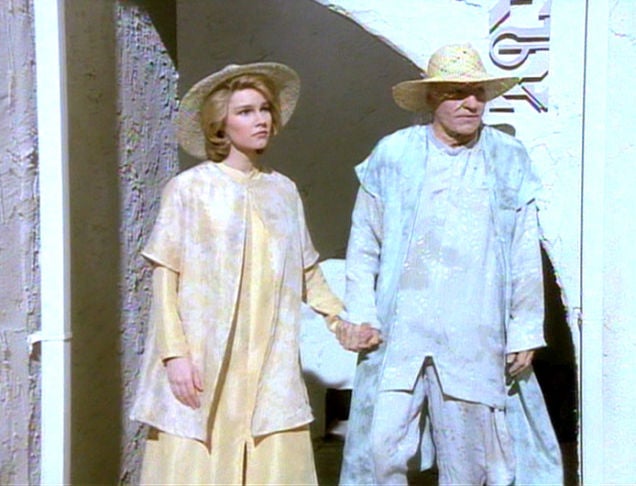
8) The Inner Light (Star Trek: The Next Generation) - Picard lives a whole life on a doomed planet, and becomes a living memorial, with just a flute as souvenir.
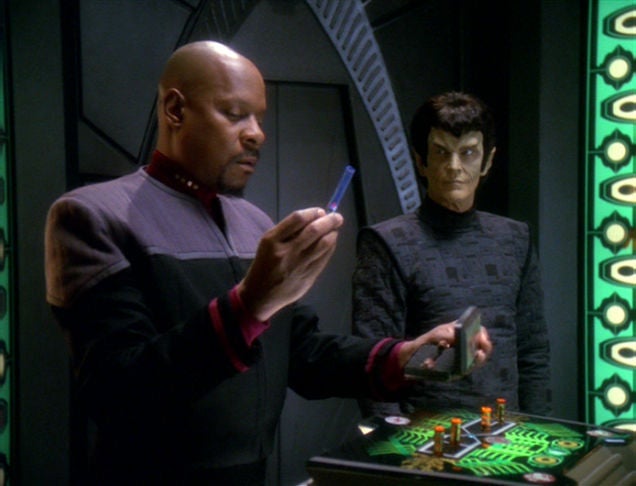
7) In the Pale Moonlight (Star Trek: Deep Space Nine) - How far will Sisko go to get the Romulans to join the war? All the way.
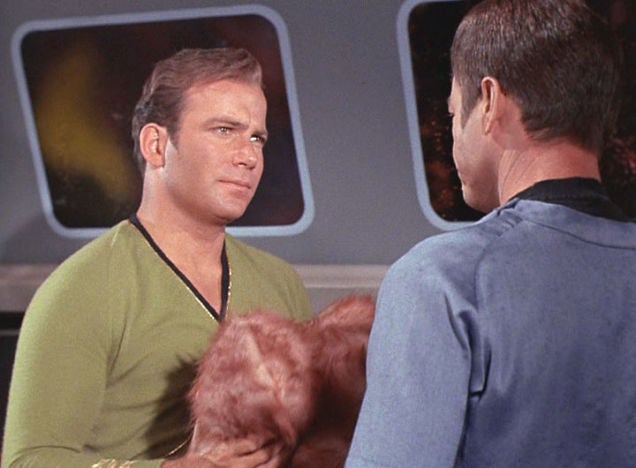
6) The Trouble with Tribbles (Star Trek) - The funniest Trek, it also faces Kirk with the most insidious threat: an organism that's born pregnant.
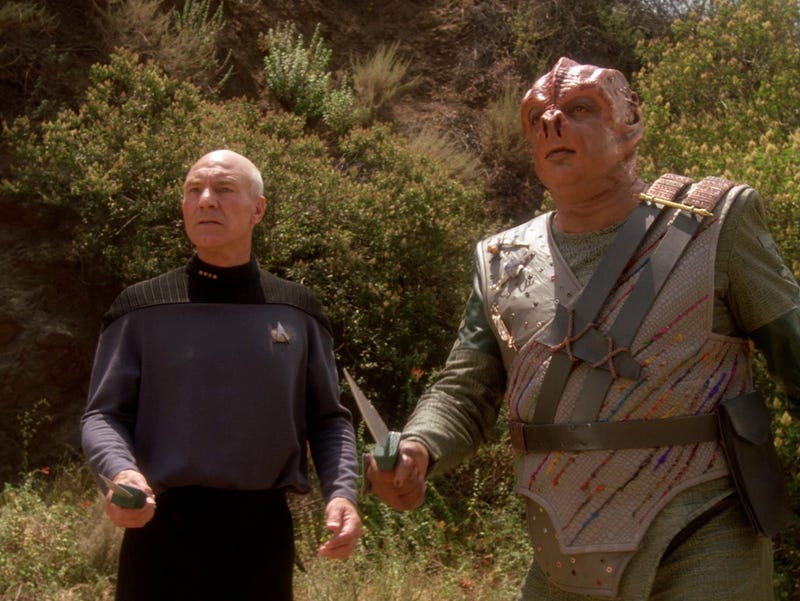
5) Darmok (Star Trek: The Next Generation) - Quibble about the alien language all you want, this parable of learning to communicate remains powerful.
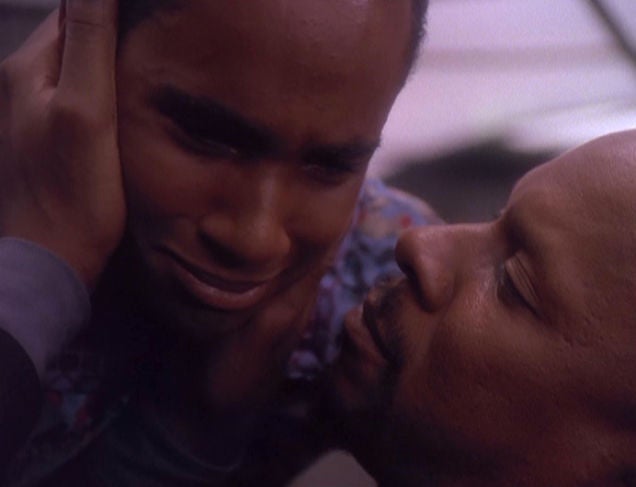
4) The Visitor (Star Trek: Deep Space Nine) - Jake Sisko has grown old as a famous writer, but he's willing to give it all up to save his father in the past. Absolutely beautiful.
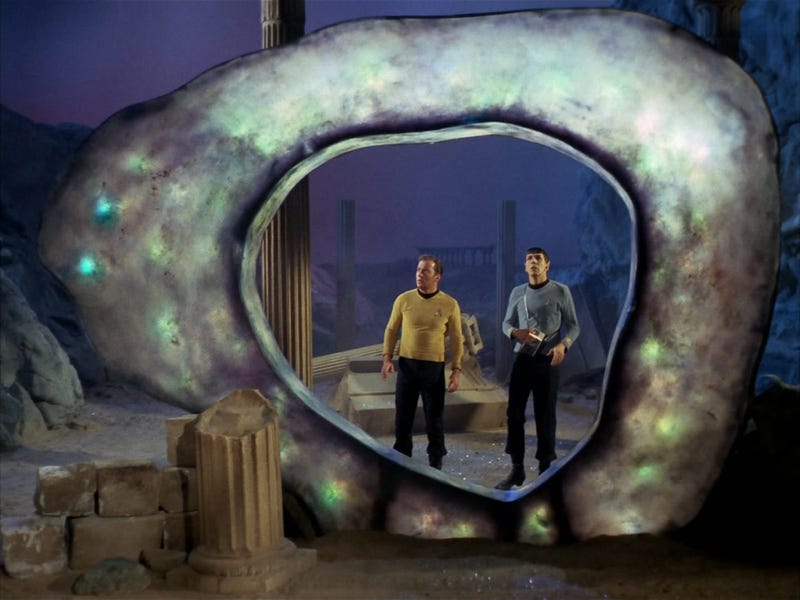
3) City on the Edge of Forever (Star Trek) - Kirk, Spock and McCoy visit the 1930s, and Kirk faces an impossible choice that proves time travel is heart-breaking.
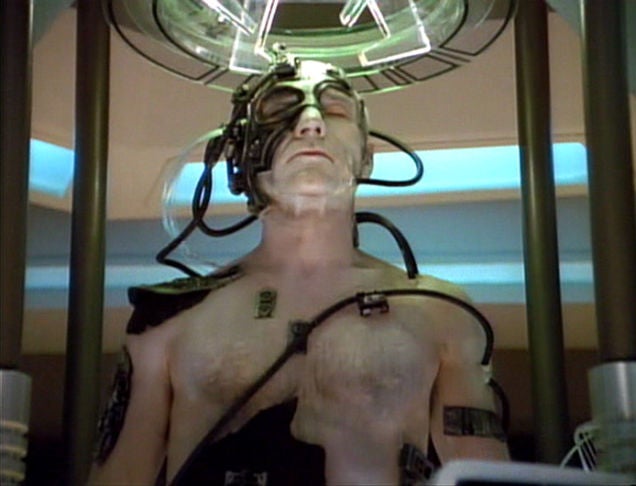
2) The Best of Both Worlds (Star Trek: The Next Generation) - The Borg turn Picard into their mouthpiece, and our heroes nearly lose.
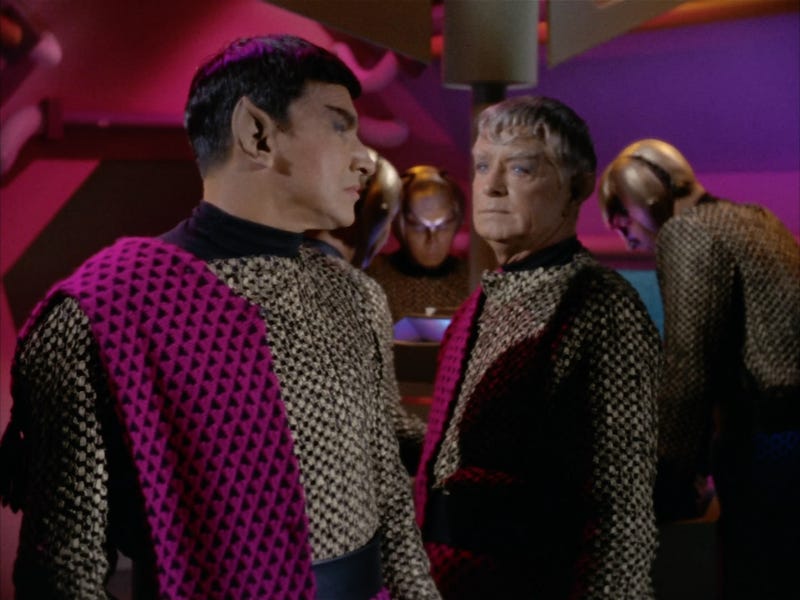
1) Balance of Terror (Star Trek) - Kirk's battle of wits with a Romulan is spellbinding, but so is the exploration of prejudice, and the idea that noble people fight on both sides.
Subscribe to:
Comments (Atom)